COMPLETE EPISODE GUIDE WITH CRITICAL COMMENTARY
Season 2 (1960-61)
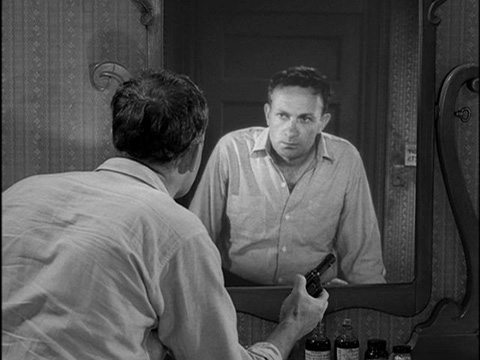
SEARCH THIS GUIDE BY SEASON: Season 1 (1959-1960) ; Season 2 (1960-1961) ; Season 3 (1961-1962) ; Season 4 (1963) ; Season 5 (1963-1964)
Rating Guide:
I - Superior; II - Excellent; III - Very Good; IV - Fair;
V - Below Average; VI - Not Good.
SEASON 5 ARTICLE
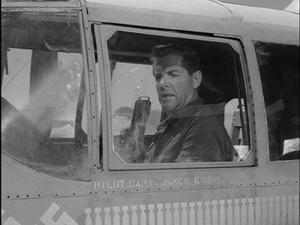
King Nine Will Not Return
ORIGINALLY BROADCAST AS EPISODE 037
STARRING CAST: Bob Cummings
WRITER: Rod Serling
DIRECTOR: Buzz Kulik
SUMMARY: Capt. James Embry finds himself in the desert, lying in the sand next
to his crashed airplane in Africa in 1943 … or so he thinks.
REVIEW: IV
The Twilight Zone made a daring move opening its sophomore year with what was essentially a one-man drama.
After all, the pilot episode "Where is Everybody" took the same form.
Moreover, Bob Cummings seemed a rather unlikely candidate, given his expertise as a comedian.
He performs reasonably well here but the rather long-winded speeches in the over-narration are dry and unengaging. The former episode suffered, albeit much less, from the same problem.
Praise must be given to the production crew, who had their disposal an old airplane, and tore it apart to give the necessary illusion of a crashed airship, then
filmed all but the ending out in the desert. Supposedly the plane was put back together and
flown again, which given the state the plane seemed to be in during shooting seems miraculous in
itself. Seen briefly in the hospital playing a nurse is Jenna McMahon, also a comedy actor and later an Emmy award-winning
writer for The Carol Burnett Show and many other comedy TV shows.
Memorable Quotations
The Doctor: You're alright, Mr. Embry. You're in a hospital. We'll look after you.
Captain James Embry: Crazy dream. Crazy dream. I went back...I went back to the desert. The Doctor: That's alright, Mr. Embry.
The Psychiatrist: No, no, no, no, no, no. It's alright, Mr. Embry. You went back to the desert. Then what?
Captain James Embry: I went back to my plane. I was looking for the fellows. I looked everywhere for them. I saw Blake but it was a mirage, an illusion. He wasn't there. None of them were there.
The Doctor: It was an illusion, Mr. Embry, but you're out of it now. You're going to be alright.
Captain James Embry: I should have been on the plane. I should have gone on that mission. I chickened out!
The Psychiatrist: You didn't chicken out. You had no way of knowing that plane wasn't going to come back. And now you realize it more as time goes by and you'll feel better for it. It's out in the open now. You don't have to hide it in a pit deep inside of you. That's what's been hurting you all these years.
Captain James Embry: Another crazy thing. An illusion or a dream or whatever. I was out there in the desert and above me in the sky - jets. Jets. Isn't that wild? 1943, African desert, and jet planes overhead. Just as if I'd...just as if I had gone back there today. Did I? Did I go back? Did I go back to my plane?
The Psychiatrist: In your mind. That's how you went back. Only in your mind.
Captain James Embry: Only in my mind.
The Doctor: Go back to sleep now, Mr. Embry. You're going to be alright.
The Psychiatrist: I think the worst part of it is over. At least the guilt is out in the open and he knows what it is.
The Doctor: That illusion certainly seems real to him.
The Psychiatrist: Well, a couple of days, a week, it'll lose all reality.
The Nurse: Doctor, these are Mr. Embry's clothes. You left them in the examination room.
The Doctor: Put them on the desk here, Nurse. I'm going back in the room. I'll take them in.
The Psychiatrist: Yeah, I'd like to talk to him in a day or so.
The Doctor: Fine, I'll run a check on him.
The Nurse: What's that?
The Psychiatrist: It's sand...
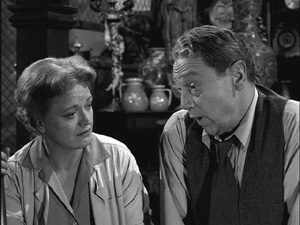
ORIGINALLY BROADCAST AS EPISODE 038
STARRING CAST: Luther Adler, Vivi Janiss, Joseph Ruskin, Lisa Golm
WRITER: Rod Serling
DIRECTOR: Don Medford
SUMMARY: Mr. and Mrs. Arthur Castle, antique shop owners, buy an old wine bottle from a hungry lady named Mrs. Gumley during the depression. Inside the bottle is a genie who gives them four wishes.
REVIEW: IV
Like "The Chaser", "The Man in the Bottle" is a simple fairytale made rather sophisticated. It features a splendid cast - particularly Joseph Ruskin as the genie and Vivi Janiss, who gives yet another strikingly realistic performance as a homely yet practical housewife. The plot is all but stretched to its limits by the time wish number four rolls around, but the comical humour that arises out of the punch line makes it all worthwhile... that even if any of us were given a million or a hundred million dollars, we'd probably not be much better off than we were originally.
Memorable Quotations
Edna Castle: What's the matter, Arthur? You look so funny. What happened?
Arthur Castle: I had a wish fulfilled. Number four. All the wishes ended the same way, in fragments and little pieces. Funny thing though, this place...this place doesn't look half bad.
Edna Castle: You alright?
Arthur Castle: Oh, I'm fine. Well, maybe we'll stop wishing for awhile. And since we obviously can't afford a brand new life, suppose we give the old one a paint job or something.
Edna Castle: I think that's a very good idea. {Laughs}
Arthur Castle: What are you laughing at?
Edna Castle: We came out of it ahead anyway. {Points to the miraculously-repaired display case}
Arthur Castle: Shouldn't be a total loss, huh. {Accidentally smashes it again with the broom handle}
(Both laugh)
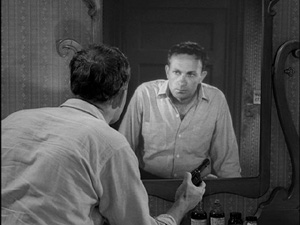
ORIGINALLY BROADCAST AS EPISODE 039
STARRING CAST: Joe Mantell, William D. Gordon
WRITER: Rod Serling
DIRECTOR: Douglas Heyes
SUMMARY: Jackie Rhoades, neighborhood criminal, waits for his boss to give him his assignment for the night. Just before he leaves to go knock off an old bartender, he undergoes a face-to-face confrontation with his conscience which results in a decision to turn his life around.
REVIEW: I
A small-time crimester named Jackie Rhoades who gets one hell of a wakeup call when his alter ego appears out of nowhere and calls his dirt. But this is no red-devil-with-pitchfork on the shoulder...this is John Rhoades, the person who's been dragged along with all of Jackie's felonies, who's sat with him in jail, who watched a decent young girl walk out of his life, who's been with him when he swiped personal property. There's no escaping John - he's in every mirror in the dingy little rented hotel room. In comes George, Jackie's boss, who gives him the evening's work - he's assigned to execute a local barkeep. But he never does the deed; thanks to John Rhoades, Jackie comes to terms with himself and he becomes completely changed in the span of only a few hours.
Two-character confrontations were examined on Twilight Zone many other times by Serling and others, but none as poignantly as was done in this script. But the 'we have two faces, one that we wear and the other that we keep hidden' theme was always a favorite of Serling's. Nothing is tongue-in-cheek here - it lives up to exactly what the opening narration says: a mortal combat between a man and himself. And it is a combat. Joe Mantell gives an Emmy-caliber performance as a dingy hoodlum, and as his conscience - a man full of intelligence who probes deeply into Jackie's past. The final shot of Jackie-turned-John is miraculous...not because of the photography, but the expression on Mantell's face as he lifts his head from his hands to confront his now-former boss...it's clear that John Rhoades has moved in and Jackie has moved out. As George, William D. Gordon is perhaps a little too suave and not nearly menacing enough...two attributes that would make him ideal for the part of the doctor in "The Eye of The Beholder" later that season.
Definitely worthy of mention as well is the perfectly-infused incidental music by Jerry Goldsmith. To boot, the episode offers one of, if not 'the' cleverest opening narrations in the entire series. Serling is seen from above, against a backdrop of the ceiling of the hotel room that looks down on the petrified Jackie Rhoades. This alone is worthy of some award or other.
Memorable Quotations
Jackie Rhoades: No, I don't! And I'll tell you what I do know. I gotta go out and do a job. I gotta knock off an old gleep on 38th Street. And if I don't do it by 2:00am, you can take what's left of me and scrape it off that mirror with a spoon. I ain't got much time. I gotta go now.
John Rhoades: You got less time than you think, but you never had time. You didn't have time when that parole officer tried to help you. You could have listened to him, but you joined another gang. Six months later you were in jail again, and that parole officer couldn't help you any more than Janie Reardon could.
Jackie Rhoades: Janie Reardon? Janie Reardon. Janie Reardon. She was a nice kid.
John Rhoades: She was a beautiful woman. She tried to set you straight. I loved her, Jackie. I loved Janie Reardon.
Jackie Rhoades: You loved her? You got a nerve. How could you love anybody? You're just a piece of glass.
John Rhoades: I could love, Jackie. I could love. I needed her, Jackie. So did you. I tried to tell you how much we needed her, but you graduated from the street gang into the shakedown rackets. Big shot, huh? Two years we spent in the pen on that one, and when we got out, Janie Reardon had gotten married and moved away. She walked out of your life, Jackie, out of our life. You cheated me out of her.
Jackie Rhoades: Don't tell me your troubles. It's nothing to me. Dames I can take or leave alone.
John Rhoades: Dames you can take or leave, huh. That's a statement for the press. You wouldn't want to have a girl, would you, Jackie? Somebody sweet and pretty. Somebody who would love you. Somebody who would be kind and gentle with you. You don't need that, do you, Jackie?
Jackie Rhoades: Why don't you cut it out! Will you do that? Will you knock it off? What do you want from me anyway? I'm asking you, what do you want from me? I'm still waiting to hear. What do you want from me?
John Rhoades: I want to take over, Jackie. I want to call the shots. I want you to let me out. I want a chance to live. I want to live with all the guts and goodness you left behind. I want to live the dreams you dreamed and never had the guts to live.
Jackie Rhoades: Fat chance, buster. Big fat chance! I'm me and you're you. And that's no statement for the press. That's the goods. I'm going out and knock me off an old man now and I'm gonna cut me a nice slice of cabbage for my troubles. I'm calling the shots and neither you nor anybody else is telling Jackie Rhoades what to do. Neither you nor anybody else. {Phone rings} Yeah? Oh, yeah, George. George, I'm doing what you told me, George. I'm just on my way out now. Yeah, George, I'm just leaving. Yeah, honest, George, honest. I'm on my way now. Yeah, yeah, I'm gonna leave right now, George. I'll meet you back here at 2:30, okay? Yeah, I'll meet you right back here, George. Okay.
Jackie Rhoades: Hey? Hey, there? Hey, where are you? Hey, glass, come on out here. Come on. Do your job now. Hey, come on. I want to see how I look, glass. Come on.
John Rhoades: It don't make any difference, Jackie, because you're not going anywhere. You go out that door, you're finished. We're both finished. That's the door to nowhere. Jackie, Jackie, let me out. I wanna take over. I gotta take over. I want a decent job, some friends.
Jackie Rhoades: I got a job, I got friends, I got everything I want.
John Rhoades: You got nothing, you got nothing but a pain inside. You got no friends, no honor. You got nothing. You are nothing. It's time to be something. Jackie, let me out. Let me take over, Jackie. This is your last chance.
Jackie Rhoades: Alright, I'll let you out of there. Come on out of there, wiseguy! Come on out! You're a liar!
George: Get up, little man. I'm gonna take your skin off, foot by foot. Nobody went to the old man's bar tonight, Jackie. Nobody at all. At last reports, he was in excellent health, thanks to you. Thanks to you, you raunchy little welsher. Well, what have you got to say for yourself, crumb, huh? What have you got to say for yourself?
John Rhoades: What have I got to say for myself, George? Not much. Just two words: I resign. That's it, George. I resign.
George: You what?
John Rhoades: I resign. You can have your gun back, plus the following. {Kicks, elbows, and slugs George} Move out, George! And don't ever come back...for anything.
John Rhoades: Room Clerk, this is Jackie - this is John Rhoades, room 14. I'm checking out. No, I'm not coming back. No, as a matter of fact, nothing's alright. The room's too hot, too small, and too dirty. It's just the place for bums, but not for me.
Jackie Rhoades: Hey, what's to do now?
John Rhoades: What's to do now? Now we go look for a job. Now maybe we get married. Now maybe we stop biting our nails.
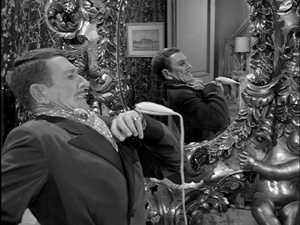
ORIGINALLY BROADCAST AS EPISODE 040
STARRING CAST: Richard Haydn, Barbara Stuart, Barney Phillips, Margarita Cordova
WRITER: Rod Serling
DIRECTOR: David Orrick McDearmon
SUMMARY: Bartlett Finchley, food critic for gourmet magazines, has always hated machines. The machines in his home don't like him that much, either.
REVIEW: V
Richard Haydn,a veteran actor of film and radio, with Barbara Stuart, (best-remembered for her part as Gomer's girlfriend Miss Bunny on "Gomer Pyle, USMC" and much later for her part as the bride's mother in "Bachelor Party" with Tom Hanks, opposite TZ alum George Grizzard as her husband) starred in an episode that would serve as a supply of plot elements for four or five later shows - about the mortal combat between man and machine. Unfortunately, this tale about man versus machine makes more of a case for technical spoofery over substance of storyline, which includes an electric razor jumping out of Finchley's hand and chasing him down the stairs. The car chase sequence at the end was hilariously ill-staged and edited, and the final shot where the car is supposed to actually hit Finchley and knock him into the pool is an unconvincing headshaker. They should have had a TitleMax car expert give some advice on how to stage the car sequences better. Yet another unanswered question was what caused his body to sink to the bottom of the pool. As the attending cop asserts: "He looked as if something were chasing him...but there was nothing to hold him down!" Quite a trick; it would seem mighty difficult to tell from a lifeless person if something had been chasing them! Barbara Stuart herself was not the episode's biggest fan either. "It was an interesting script, they probably thought I'd be good for it, but I never liked what they did with my hair. I just thought that was awful. Richard Haydn was very, very distant. I hardly talked with him. And you know something, I thought it was just the two of us in that episode - I didn't realize Margarita Cordova or anyone else was in it - she and I knew each other, once upon a time!"
Memorable Quotations
The TV Repairman: How are you today, Mr. Finchley?
Bartlett Finchley: I'll answer that burning question after you tell me what's wrong with that miracle of modern science, and also exactly how much this current larceny is going to cost me.
The TV Repairman: Well, there's two hours labor, broken set of tubes, new oscillator and a new filter.
Bartlett Finchley: How very technical, and how very convincing. I presume I'm to be dunned once again for three times the worth of the blasted thing.
The TV Repairman: Last time I was over here, you kicked your foot through the screen, remember?
Bartlett Finchley: I have a vivid recollection, thank you. The set was not working properly. I tried to get it to do so in a perfectly normal fashion.
The TV Repairman: By kicking your foot through the screen? Why didn't you just horse-whip it, Mr. Finchley? That'd show it who's boss.
Bartlett Finchley: Miss Rogers? {Rogers hands him some papers} Well, is this all you've done?
Miss Rogers: That's all I've done. That's thirty pages in three hours and a half. That's the best I can do, Mr. Finchley.
Bartlett Finchley: It's that idiotic machine, that typewriter of yours. Thomas Jefferson wrote the entire Declaration of Independence with a feather quill, and it took him only half the day.
Miss Rogers: Why don't you hire Mr. Jefferson?
Bartlett Finchley: Miss Rogers, did I ever tell you with what degree of distaste I view insubordination?
Miss Rogers: Often and endlessly. I'll tell you what, Mr. Finchley. You get yourself another girl, one with three arms and with roughly the same sensitivity as an alligator, and then you can work together till death do you part. As for me, I've had it!
The TV Dancer: Get out of here, Finchley. Why don't you get out of here, Finchley?
The Medic: You pull the body out?
The Policeman: Yeah. That's funny, they usually float.
The Medic: What do you mean, usually?
The Policeman: Well, he was on the bottom. He hadn't come up. He wasn't weighted either. There was nothing to hold him down.
The Medic: Huh.
The Policeman: His eyes were open. He looked scared, like something had been chasing him or something. The neighbors said that he'd been shouting and running around last night. I wonder what it was that could have scared him.
The Medic: Whatever it was, it's a little item he took along with him.
The Policeman: Yeah. Maybe he was drunk. Imagining things.
The Medic: Maybe.
The Policeman: Could be he had a heart attack or something.
The Medic: Could be. Could just be.
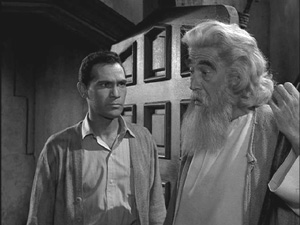
ORIGINALLY BROADCAST AS EPISODE 041
STARRING CAST: H.M. Wynant, Robin Hughes, John Carradine, Frederic Ledebur, Ezelle Poule
WRITER: Charles Beaumont
DIRECTOR: Douglas Heyes
SUMMARY: David Ellington gets lost in a storm on a walking tour and stumbles upon a hermitage, where there is a most peculiar howling man locked up inside.
REVIEW: I
The great Igor Stravinsky was one of the few truly distinguished personalities of the twentieth century who believed in The Devil personified. Whether such a person exists or not is conjectural, but what if this person did exist? It would be difficult to keep them at bay. "The Howling Man" examined the possibility with a man who gets taken in by a clever lie from the innocent-looking, pious entity (Robin Hughes) behind bars in the stone-walled, stone-floored hermitage, held captive by the 'Staff of Truth'. From then on, Ellington makes it his personal quest to capture the man he let loose.
In episodic television, it's often easy to picture other actors in certain leading roles, especially when one actor's performance is substandard. In a few cases, the part is written with a particular talent in mind. The part was not written for H.M. Wynant specifically, but it would be difficult to imagine anyone except the New York actor playing David Ellington. Wynant's distinctive facial features, combined with expertly modulated delivery of every line, made the character come alive. Wynant gave Ellington a beyond-unique personality. This was an ordinary man; intelligent in a philosophical way, yet slightly eccentric and off-center. Intelligent, in the sense that he isn't foolish enough to believe that the devil is a person, yet foolhardy in the sense that he so readily takes the word of a man who is locked up by nothing more than a wooden bar that could have easily been removed at any time. But if this man is indeed The Devil, perhaps that's all that's needed to hold him in (symbolically or otherwise). Unfortunately, Ellington realizes this a split-second too late as the man urges him to remove the staff so he can finally go free. Instantly, he falls down as the man releases a thunderbolt from a fingertip, paralyzing him.
Having been lost in a storm, Ellington was also supposed to be ill, coughing and short of breath for most of it. As Richard Conte had done in "Perchance to Dream", Wynant skillfully carried off the same feat. Superlative as well are John Carradine, Robin Hughes and Frederic Ledebur. But there were problems with the episode in back of the camera. Douglas Heyes and writer Charles Beaumont did not agree about a few crucial elements in the story. H.M. Wynant remembers, "The Howling Man, Robin Hughes, was supposed to go up over a wall at the end, and you were supposed to see his foot - a cloven hoof, proving that he was indeed The Devil Himself. Heyes didn't want to do it; Beaumont wanted it done. Ultimately, it wasn't done. They argued about it, but the finished product was superlative. Buck Houghton and I ran into each other on the MGM lot a few weeks after the shooting was done," says Wynant. "He said to me, ''The Howling Man' turned out really nicely! Great job!' I sort of shrugged it off, thinking it was just another paying job. I never thought anyone would remember it after it aired even ONCE! Surprisingly, everyone still does!"
Like "Eye of the Beholder", "The Invaders", "The Silence" and many others, the photography brings all the action to a much higher plain. Virtually all of "The Howling Man" was shot at an angle, giving it an almost Hitchcockian level of suspense. Some have criticized the Howling Man's walk down the corridor as corny and the complexion changes unconvincing. This is the highest point of the piece, wherein Robin Hughes goes from being dressed in rags to Satan himself - in the flesh - dressed in a cape and sporting horns, only to swiftly disappear in a cloud of smoke. It required more than five distinct makeup jobs on Hughes and the results were amazing...and horrifying. Says writer George Clayton Johnson, "When I first saw that, it curdled my blood."
Memorable Quotations
Brother Jerome: I must ask you to leave the hermitage, Mr. Ellington. We have no facilities for the care of the ill. Arrangements can be made at Schwandorf.
David Ellington: Now just a minute...
Brother Jerome: No, not a minute, not another second, Mr. Ellington! Now!
David Ellington: Why?
Brother Jerome: I've already explained that.
David Ellington: No, you've explained nothing. No one asked me to come here, I realize that, but that's no excuse for your behavior.
Brother Jerome: My son...
David Ellington: I'm not your son.
Brother Jerome: You don't understand.
David Ellington: That's right. I don't. So why don't you tell me? Why in such a hurry for me to leave? What are you afraid I'll find out? It's the man you have locked up in the cell, isn't it, Brother? Well, that isn't a secret anymore. I know about him.
Brother Jerome: What man is this, Mr. Ellington?
David Ellington: The one we just left. The one who's been screaming his head off.
Brother Jerome: I'm not sure you know what you're saying.
David Ellington: Look, Brother, I don't know much about this cult of yours, what's permitted, what isn't permitted, but I seriously doubt if you have the authority to imprison a man against his will.
Brother Jerome: That is quite true. We have no such authority.
David Ellington: Then why have you done it?
Brother Jerome: No man has ever been imprisoned in the hermitage, Mr. Ellington.
David Ellington: I was just talking with him.
Brother Jerome: You talked to no man. You have been very ill, Mr. Ellington. You've suffered delirium.
David Ellington: {The Howling Man howls} Alright, don't tell me you didn't hear that. Honest men make unconvincing liars. I'll find out eventually, you know.
Brother Jerome: What do you mean?
David Ellington: Just what I said. And the police will be very interested to learn that you people are keeping a man in prison here.
Brother Jerome: I tell you there is no man!
David Ellington: Fine, alright, forget it. (Starts to walk out)
Brother Jerome: Mr. Ellington?
David Ellington: Yes?
Brother Jerome: Would you really go to the police?
David Ellington: Would you?
Brother Jerome: Very well. I have told you the truth but only a part of it. Now I see I shall have to tell you the whole truth. Shut the door, Mr. Ellington. (The Howling Man howls)
David Ellington: Then you do hear it.
Brother Jerome: As I have heard it every hour of every day for five long years.
David Ellington: Why did you lie?
Brother Jerome: I didn't. When I told you that no man held at the hermitage, I was being perfectly honest. What you saw is not a man. It is the devil himself!
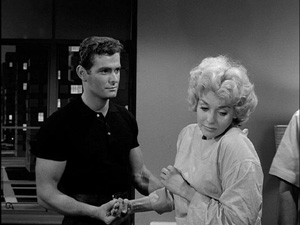
ORIGINALLY BROADCAST AS EPISODE 042
STARRING CAST: Maxine Stuart, William D. Gordon, Jennifer Howard, Edson Stroll, Joanna Heyes
WRITER: Rod Serling
DIRECTOR: Douglas Heyes
SUMMARY: Janet Tyler, societal outcast, has remained hospitalized in effort to repair her hideously disfigured face. But just how disfigured is her face?
REVIEW: I
By what standard is beauty defined? By popular belief, physical beauty is that which is appealing to the eyes. But in some other world, in some other time, could that which we perceive as beautiful really be hideous? Apparently so.
Maxine Stuart portrayed the only character in all of Twilight Zone whose face is never seen. She started her career in TV in some of the first TV shows done in the mid 1940's, on such anthology series' as "The Lux Video Theater" and "Sorry, Wrong Number" and worked for the better part of the next four decades on screen and on stage. In the 1990's, Ms. Stuart had a regular role alongside actor Parley Baer on "The Young and the Restless" and received an Emmy nomination for a guest spot as Kevin Arnold's piano teacher on "The Wonder Years" in 1989. As Janet Tyler in Serling's story, Maxine Stuart submitted a phenomenal performance. She had a voice that was perfect for the part - somewhat gravelly and hard-edged, reflective of a woman who has gone through hell.
So why was Stuart not the Janet Tyler revealed after the bandages finally come off? Donna Douglas was a bit prettier. Unfortunately, Donna Douglas will always be known as the demure girl who loved raccoons, Ellie May Clampett of "The Beverly Hillbillies". To match Douglas' beauty, an equal was chosen in Edson Stroll, a versatile actor and voiceover artist who started his career as a New York model. A household name to legions of "Twilight Zone" fans, Mr. Stroll here plays Walter Smith of 'the village of ugly people.' He later went on to become a regular on "McHale's Navy", then moved behind the camera as one of Hollywood's leading voiceover actors. His delivery of a mere few lines in "Eye of the Beholder" indeed ices the cake on the superclassic episode. Edson Stroll says, "The production of that episode was very different. What I remember most is that they kept me away from the rest of the actors - who were in costume of course - during the time I was on the set. They really didn't want me knowing what they were doing - the director, Doug Heyes, probably felt that it would play negatively into my performance. Donna Douglas, I knew very well. I think that was when I first met her and we kept in touch for a good while thereafter."
Incidental note - the episode "The Hungry Glass", directed by Douglas Heyes, features a starring cast of TZ alumni. William Shatner and Elizabeth Allen, and Russell Johnson and Joanna Heyes, play two husband-wife couples who go on a vacation to a most spooky house where Donna Douglas can be found in a mirror.
Equally high accolades go out to the late Douglas Heyes and George T. Clemens - to Heyes for remarkable staging that made it glow like polished ebony and to Clemens for first class photography (for which he won an Emmy the following spring).
Memorable Quotations
Janet Tyler: Doctor? Doctor, may I walk outside? Please, may I? May I just go and sit in the garden? Just for a little while? Just, just to feel the air? Just to smell the flowers? Just, just to make believe I am normal? If I sit out there in the darkness, then the whole world is dark, and I'm more a part of it like that. Not just one grotesque, ugly woman with a bandage on her face, with a special darkness all her own. I want to belong. I want to be like everybody. Please, doctor. Please help me.
Dr. Bernardi: There are many others who share your misfortune. People who look much as you do. One of the alternatives, just in the event that this last treatment is not successful, is simply to allow you to move into a special area in which people of your kind have been congregated.
Janet Tyler: People of my kind congregated? You mean segregated! You mean imprisoned, don't you, Doctor? You're talking about a ghetto, aren't you? A ghetto designed for freaks!
Dr. Bernardi: Miss Tyler! Now, the state is not unsympathetic. Your presence here in this hospital is proof of that. It's doing all it can for you. But you're not being rational, Miss Tyler. Now you know you can't expect to live any kind of a life among normal people.
Janet Tyler: I could try. I could wear a mask or this bandage. I wouldn't bother anybody. I'd just go my own way. I'd get a job, any job. Who are you people anyway? What is this State? Who makes all these rules and conditions and statutes that people who are different have to stay away from the people who are normal? The State isn't God, Doctor.
Dr. Bernardi: Miss Tyler, please.
Janet Tyler: The State is not God! It hasn't the right to penalize somebody for an accident of birth! It hasn't the right to make ugliness a crime!
Dr. Bernardi: Miss Tyler! Miss Tyler, stop this immediately!
Janet Tyler: I feel the night out there. I feel the air. I can smell the flowers. Oh, please, please, take this off me. Please. Please take this off me. Please take this off me. Oh, please, take this off me! Take it off me! Take it off me! Help! Somebody help me! Help! No, no, no, no, let me go. Let me go. Please, please, let me go. Let me go, please. Oh, please. Please, let me go. Please, please, let me go.
Dr. Bernardi: Alright, then I will take the bandages off. Get the anesthetist.
The Nurse: Yes, Doctor.
The Nurse: You look tired, Doctor.
Dr. Bernardi: Do I? Well, I hadn't thought about it. I suppose I am.
The Nurse: You've been under a great deal of tension. I know how much it means to you, this case in 307.
Dr. Bernardi: Well, you try to be impersonal about these things. You do everything medically possible, everything humanly possible, and then in the end you cross your fingers and you hope for a miracle. And, you know, once in a while a miracle does happen. Just often enough to let you know that you're not wrong or foolish to hope for one.
The Nurse: You're destroying yourself this way. Forgive me, but you mustn't let yourself get personally involved here.
Dr. Bernardi: I know. You think I haven't told myself that? You see, Nurse, I've looked underneath those bandages.
The Nurse: So have I. It's horrible.
Dr. Bernardi: No, I mean deeper than that. Deeper than that pitiful, twisted lump of flesh. Deeper even than that misshapen skeletal mass. I've seen that woman's real face, Nurse. The face of her real self. It's a good face. It's a human face.
The Nurse: I understand. But I must confess. It's easier for me to think of her as human when her face is covered up.
Dr. Bernardi: But why? Why must we feel that way, Nurse? What is the dimensional difference between beauty and something repellent? Is it skin deep? No, less than that! Why, Nurse? Why shouldn't people be allowed to be different? Why?!
The Nurse: Doctor, be careful! What you're talking...
Dr. Bernardi: I know...treason.
The Nurse: Oh, this case has upset your balance, your sense of values.
Dr. Bernardi: Well, I suppose. Don't be concerned, Nurse. I'll be alright once the bandages are off. Once I know one way or the other.
The Leader: We know now that there must be a single purpose! A single norm! A single approach! A single entity of peoples! A single virtue! A single morality! A single frame of reference! A single philosophy of government! We must cut out all that is different like a cancerous growth! It is essential in this society that we not only have a norm, but that we conform to that norm! Differences weaken us! Variations destroy us! An incredible permissiveness to deviation from this norm is what has ended nations and brought them to their knees! Conformity we must worship and hold sacred! Conformity is the key to survival!
Janet Tyler: Mr. Smith?
Walter Smith: Yes?
Janet Tyler: Why do we have to look like this?
Walter Smith: I don't know, Miss Tyler. I really don't know. But you know something? It doesn't matter. There's an old saying. A very, very old saying. Beauty is in the eye of the beholder. When we leave here, when we go to the village, try to think of that, Miss Tyler. Say it over and over to yourself. Beauty is in the eye of the beholder. Come on now. We'll get your things and we'll leave.
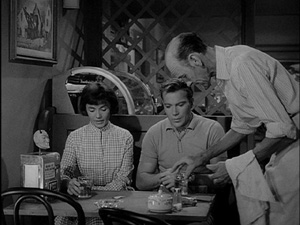
ORIGINALLY BROADCAST AS EPISODE 043
STARRING CAST: William Shatner, Patricia Breslin, Guy Wilkerson, Stafford Repp
WRITER: Richard Matheson
DIRECTOR: Richard L. Bare
SUMMARY: The honeymooning Carters have a car blow-out in Ridgeview, Ohio. They visit a diner for lunch and have an odd encounter with a mystic seer.
REVIEW: II
The unofficial Twilight Zone essay on superstition was captured by Richard Matheson. Honeymooning couple Don and Pat Carter nearly get taken in by the power of a mystic seer in a diner. But sanity prevails and they realize it is powerless. Meanwhile, another couple who haven't been unleashed from its evil clutches enter just as they're leaving. What could have lapsed into the land of tongue-in-cheek is taken very seriously here. Their escape is a narrow one, but with enough suggestion that they have gone beyond the silliness of the object.
Once upon a time, there was a fine actor named William Shatner, who around 1961 starred in a film called "The Intruder", directed by Roger Corman. Several years earlier, he had roles in "The Brothers Karamazov" and "Judgement at Nuremberg".
Filmed in the fall of 1960, Shatner and Patricia Breslin impressed writer Richard Matheson with their portrayal of the innocent young newlyweds.
"Nick of Time" lacks the skybound fireworks of the best-written episodes. Here, the fireworks lie beneath the surface. Should the viewer become completely involved, it is easily the most powerful and frightening as the better-known "Zone" thrillers.
Memorable Quotations
Pat Carter: Office Manager. I think it's wonderful.
Don Carter: Let's ask him something else. He really came through on that one.
Pat Carter: Why don't you ask him why he didn't warn us that the whole wheat bread is stale?
Don Carter: Does he/she love me? I know the answer to that one. Will I become rich? I know the answer to that one too. I'm gonna be the world's millionaire accountant.
Pat Carter: Office Manager.
Don Carter: Right! Is it really gonna be four hours before we get out of here? {Reads card} You may never know. What does that mean?
Pat Carter: Who knows?
Don Carter: He does.
Pat Carter: Well, it'll cost you another penny.
Don Carter: I'm an Office Manager now. What do you mean we may never know? No, that's not a yes or no question. You mean, something will keep us from knowing? Something will happen to us? {Reads card} If you move soon. What's that mean?
Pat Carter: Well, he's a mystic. What do you expect? {Don puts another penny in the machine} I can see I'm gonna have to be the frugal one in our family.
Don Carter: Just one more. You mean if we're not supposed to move we're supposed to stay here?
Pat Carter: Just one question per penny, please.
Don Carter: {Reads card} That makes a good deal of sense. How long should, no, uh, should we stay here until two-thirty? {Reads card} Try again. Should we stay here until three o'clock? {Reads card} There's no question about it.
Pat Carter: Don, let's take a look around the town, hmm?
Don Carter: Every answer seems to fit.
Pat Carter: You're joking, aren't you? I mean, Don, no more.
Don Carter: If we don't stay in here until three o'clock, something bad will happen to us?
Pat Carter: Don, for heaven's sake.
Don Carter: Read it.
Pat Carter: {Reads card} Do you dare risk finding out? Don, let's go.
Don Carter: Oh, I haven't finished my sandwich yet. Don't you want some ice cream?
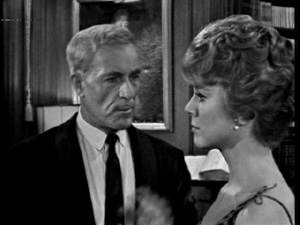
ORIGINALLY BROADCAST AS EPISODE 044
STARRING CAST: Inger Stevens, John Hoyt, Irene Tedrow
WRITER: Rod Serling
DIRECTOR: Jack Smight
SUMMARY: Dr. and Mrs. William Loren have retired from the outside world and live their lives completely indoors with the aid of electronic servants...and a daughter who desperately wants to break out and join society.
REVIEW: III
While not a spectacular entry, "The Lateness of the Hour" has its share of value. It had fine talent in John Hoyt, a prized character actor, and also in Inger Stevens and Irene Tedrow, both of whom had appeared in "Zone" episodes in the first season. The sequences where Jana lectures everyone about her distaste for the sick modus operandi that has plagued their home for years make a nice impact, as does the teaser, when she gives an onry maid a shove down the stairs. Unfazed, the maid rises with a smile. Just after, there's a central shot of all the servants departing in different directions, leaving Serling to deliver the opening narration.
The three lead actors give arrestingly emotional performances that display their dramatic gifts, never more shining than in the second act. What's never explained, though, is how the robot Jana came to know about true love or the outside world, and desire to assimilate, if she's never been a part of it. Obviously Loren did not program her to know about these things in the same way a human does...or at least not in a way that would prevent her from finding out the truth about her identity.
Memorable Quotations
Robert: Miss Jana, you'll forgive me but that was most intemperate of you.
Gretchen: I consider that unforgivable behavior.
Nelda: Miss Jana, you must have respect for your parents.
Jensen: I agree. You must show respect. (All the servants start to speak)
Jana Loren: Stop it! You're jokes! That's what you are. Hysterical jokes. With your sad little homilies and your mouthed cliches, you're nothing but walking record players. That's all any of you are. Walking record players!
William Loren: Jana, you're making it difficult for me to be patient. Very difficult indeed.
Jana Loren: I do apologize, father. I know how accustomed to perfection you are and I hate to throw a stone in that serene pool of yours but you forgot something. Do you know that? You forgot something. They may be indestructible, father, but you're not!
Jana Loren: Oh, mother! We're going to live like normal people. Do you understand? Normal people. We're gonna give parties and we'll take trips and we'll make friends. And I'll find a young man. I'll find a young man and, before you know it, we're going to have grandchildren. Oh, father, grandchildren! What's the matter? What is it?
Mrs. Loren: It's what you said about grandchildren.
William Loren: You see, what your mother means, Jana, what she means is it's perfectly normal and natural for parents to think of their children as children and then, when suddenly they grow up and talk of having children of their own, it's a little difficult for parents to absorb quite so quickly.
Jana Loren: Something's not right. Something's not right. Something's not right. What is it? What is it? {Grabs the photo album} Why aren't any of my pictures in the photo albums? There are no pictures of me here at all.
Mrs. Loren: Jana, dear, there are many pictures of you. Why, see, here's a picture of you at Easter. And, why, there are pictures of you decorating the Christmas tree last year...
Jana Loren: Not as a little girl, mother. There are no pictures of me as a little girl. Pictures of you and father and robots. Always pictures of the robots, ten years ago, twenty years ago, but no pictures of me. Why? I want you to tell me why. Why? It's not true. Oh, it couldn't be true. Please tell me it's not true.
William Loren: Jana, you are our daughter. You know you're our daughter and you remember everything from your childhood. You remember the schools you went to, the children you played with, and you remember all the places you went to. You do remember them, Jana. You've got to.
Jana Loren: (angry) Why have I got to remember them? Because you fed them to me? A memory track. A memory track. What am I? Oh, please tell me what I am.
William Loren: It doesn't make any difference. It doesn't make any difference at all, Jana. We were childless. We had nothing of our flesh to leave behind. No, nothing of our hearts, nothing of our love. So, you see, we got you. Jana Loren: You made me. You built me. You manufactured me. Of course. The maid was built as a maid. The butler manufactured as a butler. And the cook and the handyman, all for a particular purpose. And a daughter. You built a daughter!
William Loren: Jana! I created you as a thing of love. It doesn't matter what you are or how you got here. You're our daughter. Jana, you've got to understand that. You're our daughter.
Jana Loren: I can't be your daughter. I'm a thing! I'm a machine! A machine!
Mrs. Loren: Jana! Jana!
Jana Loren: {Repeatedly hits her arm against the bannister} No pain! No pain at all! No pain!
William Loren: Jana, stop it!
Jana Loren: No pain! No love. I can't even feel love. Oh no!! (sobbing uncontrollably)
Mrs. Loren: Jana!!
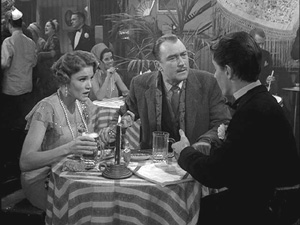
ORIGINALLY BROADCAST AS EPISODE 045
STARRING CAST: Brian Aherne, Pippa Scott, Charles S. Carlson, Sydney Pollack, King Calder
WRITER: E. Jack Neuman
DIRECTOR: Buzz Kulik
SUMMARY: Aging Broadway actor Booth Templeton is scheduled to do a play. On the first day of rehearsals, he somehow gets preoccupied and stumbles off the set and back into 1927.
REVIEW: I
The idea of 'going home again' was tackled in "Walking Distance" and a few other shows. This masterfully written fantasy is not much talked about, and is the only Twilight Zone script penned by E. Jack Neuman. This is a classy episode in every regard, right down to the sets used for the smoke-filled private restaurant and a stage band playing jazz characteristic of the roaring twenties. Most moving is the performance of legendary silver screen actor Brian Aherne, who clearly felt the character he was playing, who in fact was much like Ida Lupino's Barbara Jean Trenton of "The Sixteen Millimeter Shrine". Perhaps Booth Templeton's days in the theater are numbered, but he gets a chance to go back to the old days, and realized that the present is a time to be savored. Pippa Scott, one of the great but underrated actresses of our time, is outstanding as his lover of many years ago, who died prematurely, and who gives him the push to go back to the present and savor the moments.
Aside from the magic of Aherne and Scott, there is another spark in "The Trouble With Templeton" - Sydney Pollack as young and cocky Arthur Willis, director of the play. This was an early role for Pollack, seeming eons before "Out of Africa", "Tootsie", or "The Firm". The role is a small one, but magnified by a memorable performance.
Trivia: Pippa Scott's mother's name was Laura. In the mid 2000s, she turned in another memorable performance in the independent film "Footprints", about the magic of Hollywood Boulevard, alongside TZ alum H.M. Wynant.
Memorable Quotations
Laura: Oh, I'd be glad to get into a cold tub. Oh, Booth, will you tell me why on this glad green Earth you're wearing an overcoat for on a night like this. Will you tell me now, Booth? I mean, really.
Booth: I'm not so certain that it is a glad green Earth. Oh, Laura, Laura, darling. Barney, I'm not so certain of this Earth or of anything in it right now. Oh, please, listen to me, listen to me, won't you, Laura? Laura, something's happened. Something very strange. Please, try to understand. This isn't makeup. I've grown older, darling. In another world many, for many, many lonely years, I've had only a memory of you to live on. You too, Barney. Why you were my one and only best friend. But both of you have been only memories for a long time. And now, tonight, or today, or whatever it is and wherever I am in space or time, I have you back again. You're alive! You didn't die! Life is going on here. It's just as if you'd never died. Either of you. You do understand, don't you?
Barney: Oh, sure.
Booth: Laura, do you understand?
Laura: Sure! Come on, let's have a good time, huh?
Booth: Laura, why are you so different?
Laura Templeton: Well, that's the way I am, Booth. That's the way it is. I mean, what'd you expect?
Barney Flueger: Yes, old chap, what did you expect?
Booth Templeton: I, I don't know. But you were my love. Everywhere at all times. Why, we couldn't walk a street or sit in a restaurant without everybody knowing that we were in love.
Laura Templeton: Are you finished?
Booth Templeton: I don't like what you've become. {Both Laura and Barney start laughing} Shut up! Shut up, both of you! Shut up! Laura, Laura, come with me.
Laura Templeton: You're a silly old fool of a man! {Looks at the band} That's for me! {Starts to dance}
Booth Templeton: Stop it! Stop it!
Laura Templeton: Why don't you go back where you came from? We don't want you here!
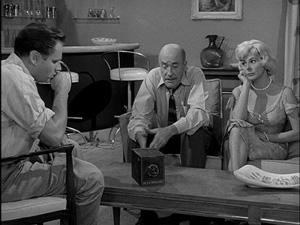
ORIGINALLY BROADCAST AS EPISODE 046
STARRING CAST: Fred Clark, Jean Carson, Adam Williams, Marcel Hillaire
WRITER: Rod Serling
DIRECTOR: John Rich
SUMMARY: Chester and Paula Deidrich rob a curio shop. Among the loot they manage to abscond with is a most unusual camera that can take pictures of things that will happen five minutes before they actually happen.
REVIEW: IV
Rod Serling saw comedic character actress Jean Carson in a play in Los Angeles the late 1950's. He came backstage and told Jean that he had an idea in mind that would be just right for her. She relates, "CBS refused to accept several of the endings he wrote for "A Most Unusual Camera", feeling that we [Paula, Chester, Woodward] were not punished enough for our misdemeanors. I kind of felt it was an arbitrary ending with all of us dumping out of the window and dying, but it was up my alley and just a delightful shoot to do." The one Serling came up with was a not what it could have been, and quite probably it was the only one that worked well. What could these three do...go out and join the Peace Corps?! Not likely.
Hired to direct was John Rich, the multi-award winning comedy director whose career began in 1952. Rich is best known for his spectacular guidance of the first three seasons of "All In the Family" and also the first three of "The Dick Van Dyke Show". Known as an extremely forceful personality who demanded nothing but the best from his actors, it is obvious that Rich had trouble with his two Twilight Zone assignments (the other was "A Kind of Stopwatch" of the fifth season). Both are irritating and forgettable.
A simple fantasy about a "kooky camera with ten pictures to an owner", Fred Clark, Carson, and Adam Williams (previously the sailor in "The Hitch Hiker", he had a part as a secret agent in Hitchcock's "North by Northwest", filmed in 1958) all do splendidly as the crooks. Clark gives Chester Diedrich just the right amount of bristle, well-balanced by sandpaper-voiced Paula, who constantly complains of palpitations. Williams' Woodward is a TZ character who's either loved or hated...either way, Williams was a good choice for the part, and he remains the most notable fixture of the piece.
Memorable Quotations
Paula Dietrich: {Reading from the newspaper} Sometime during the morning the rear door of the antique shop was jimmied open. The police surmise that the thief, obviously working with an accomplice, entered and began to remove items from the shelves. Mr. and Mrs. Jenson J. Brown, the proprietors of the shop, listed the following collector's items as among the goods stolen. Two vases of the Ming Dynasty...
Chester Dietrich: I don't know what dynasty they're from, but they ain't Mings. These are from some rummage sale. They're worth about half a shuck apiece. (Throws the vases on the ground)
Paula Dietrich: Chester!
Chester Dietrich: It's larceny! Plain, no-good larceny. He's just padding that list for his insurance. How do you like a crook like that?
Paula Dietrich: {Continues reading the paper} An antique silver service for twelve. A Louie XIV candelabra, a Queen Anne chest...
Chester Dietrich: A phony Louie XIV candelabra. A set of U.S. Navy surplus tableware. A chest worth maybe three dollars and fifty cents, tops!
Paula Dietrich: Three oil paintings by Picasso.
Chester Dietrich: Three posters in frames. The guy that painted these thinks that Picasso is a foreign sports car.
Paula Dietrich: Two teakwood hand-carved cigarette cases...
Chester Dietrich: Ah, knock it off, knock it off.
Paula Dietrich: Hey, they forgot this. An antique camera, no less.
Chester Dietrich: Big deal. Well, it fits with the rest of the haul. Everything else is for nothing. Figures, we get a camera that's for nothing.
Paula Dietrich: Chester, I'm scared. I'm palpitating.
Chester Dietrich: You and your phony palpitations! A little palpitating never hurt anybody. What's there to be scared about? The thing has obviously gone tilt or something. Look, now, look. Woodward isn't here. Woodward couldn't possibly be here. Woodward's not gonna be here. He's serving time. He's nine hundred miles away in a cell block. I don't care what that crazy camera says. Whoever is in this picture, it is not Woodward.
Paula Dietrich: Woodward!
Woodward: Hi, Paula! Hi, Chet! I didn't wanna wake you so I jimmied the door open. I broke out. Me and another guy in a laundry truck. That's nice, huh. I didn't think you'd mind if I stay with you for a few days. Well, you don't, do you? I was thinking, if I was around, you two wouldn't fight so much. You still all the time fighting? {Chester hands him the photograph} What's this, Chet? Well, you like that? There I am, standing by this very door wearing the clothes I got on. How about that? I tell you, science is wonderful! To be able to take a picture of a...wait a minute. Wait a minute! Like, uh, how come?
Chester Dietrich: Science. We got something here for humanity.
Woodward: Who?
Chester Dietrich: Humanity.
Paula Dietrich: You got a leak in your attic? What's humanity ever done for us?
Chester Dietrich: Sure, Paula, sure. That's what I meant. Just what you said. That's the way we are. Everything for us. Nothing for anybody else. Well, I've risen above all that now. I say let's give this to the world. Here, world. A gift from Chester Dietrich and his wife.
Woodward: And me too, Chet! Don't forget Woodward.
Chester Dietrich: Yeah, and you too, Woodward. Here, world. A gift for humanity. A gesture. A gesture to show the size of the heart of Chester Dietrich and wife...and Woodward. Woodward: Yeah, that's better.
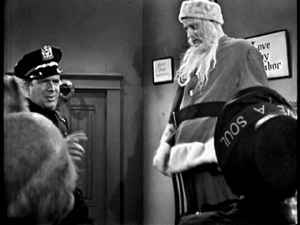
ORIGINALLY BROADCAST AS EPISODE 047
STARRING CAST: Art Carney, Val Avery, John Fiedler, Robert Lieb, Burt Mustin, Meg Wyllie
WRITER: Rod Serling
DIRECTOR: Jack Smight
SUMMARY: Henry Corwin, a department store Santa Claus who is fond of the bottle, comes upon a magical bag that can produce whatever Christmas presents he wants.
REVIEW: II
"Night of the Meek" was the unofficial Twilight Zone Christmas episode. In the role of Santa, Art Carney was in his element, much like the Ed Norton he'd created some years earlier for "The Honeymooners". John Fiedler is mainly remembered for his stint on "The Bob Newhart Show", where he played Mr. Emil Peterson, Bob's high-pitched neurotic group therapy member. It is he who puts the icing on the cake in one of two holiday Twilight Zone shows (the second was "Five Characters in Search Of an Exit", done one year later). Nothing overly special here, save for a few bits of magic thrown in here and there and brought alive by a set of comical characters who warm the heart with holiday spirit.
A curiosity: the closing narration by Serling ended with the line "...and a Merry Christmas to each and all". This line was deleted from the shooting script.
Memorable Quotations
Henry Corwin: You know another reason why I drink, Mr. Dundee? So that when I walk down the tenements, I can really think it's the North Pole and the children are elves and that I'm really Santa Claus bringing them a bag of wondrous gifts for all of them. I just wish, Mr. Dundee, on one Christmas, only one, that I could see some of the hopeless ones and the dreamless ones, just on one Christmas, I'd like to see the meek inherit the Earth. That's why I drink, Mr. Dundee, and that's why I weep.
Mr. Dundee: Going home, Officer Flaherty?
Officer Flaherty: Going home, Mr. Dundee. And you?
Mr. Dundee: Going home, Officer Flaherty. This is the most remarkable Christmas Eve I've ever had. {Sleigh bells are heard overhead} Flaherty, I could have sworn that I...did you see it?
Officer Flaherty: I thought I did.
Mr. Dundee: Well, what did you see?
Officer Flaherty: I don't think I ought to tell you, Mr. Dundee. You might report me for drinking on duty.
Mr. Dundee: No, no, go ahead. What did you see?
Officer Flaherty: It was Corwin, Mr. Dundee, big as life in a sleigh with reindeer, sitting next to an elf and riding up toward the sky. That's about the size of it. Ain't it, Mr. Dundee?
Mr. Dundee: Flaherty, you better come home with me and we'll pour out some hot coffee and we'll pour some brandy in it and we'll ...and we'll thank God for miracles, Flaherty.
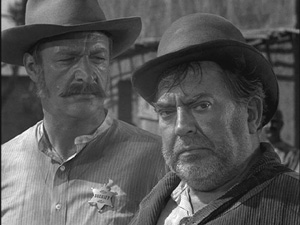
ORIGINALLY BROADCAST AS EPISODE 048
STARRING CAST: Thomas Gomez, John Larch, Vladimir Sokoloff, John Alonso, Andrea Margolis
WRITER: Rod Serling
DIRECTOR: Douglas Heyes
SUMMARY: A Mexican man drunkenly runs over a small child and kills her, and is sentenced to be hung. But thanks to some magic dust, the rope breaks and the girl's family forgives him.
REVIEW: IV
Sykes - a greasy, corpulent oaf, taunts a young jailed man and tricks his 'dumb' family into buying some (phony) magic dust for 100 pesos, which will obliterate the hatred of all it touches. By the grace of the gods, the new-strand hemp that was supposed to hang him breaks and the family of the deceased agrees to let him go free. He does go free...and the rotten Sykes is still 100 pesos richer. But then the "magic dust" somehow takes its toll on Sykes' conscience, and he gives the money back to some needy neighborhood children.
"Dust" offered entertaining performances by Thomas Gomez as the frauding peddler, Sykes, and Vladimir Sokoloff as Mr. Gallegos, the father of the convicted man (Sokoloff was of Russian nationality but he gave three arrestingly emotional "Zone" performances as Mexican men shortly before his death in 1962). Gomez's characterization was no less than perfect as a corpulent, unscrupulous, heckling fatass. But despite this, this Aesop's fable emerges much like the little town it represents - sleepy and backwards, and the magic dust of "Dust" obviously didn't quite hit its director. Douglas Heyes was clearly not the best man for the job. As in "Elegy", there is a lack of energy and suspense. In "Eye of the Beholder", "The Howling Man", and "The After Hours", Heyes worked his own magic and created the unforgettable.
The part of the little boy who asks "Is that the man they're gonna put the rope on? Will it hurt?" was none other than 4 year old Douglas Heyes, Jr. The role was intended for his older brother, Mark, who became ill at the last minute.
Memorable Quotations
Sykes: Well, what'll it be for you today, Mr. Koch? Don't need any more rope, do you? Hey, you oughta see the fancy five strand hemp I sold the town for your party, Gallegos. It could lift five of you. Any more at home like you, Gallegos? Well, what'll be your fancy, Mr. Koch?
Sheriff Koch: What do I fancy, Sykes? I'll tell you what I fancy. I'd like you to take your fat carcass and your loud mouth out into the open air. This is a small room and it's a hot time of the morning.
Sykes: So what about you, Gallegos? What would your pleasure be? A nice hacksaw, maybe? There's gonna be a funeral procession down that street, Gallegos. You better go to the window and watch. They're gonna be burying the little girl that you mangled under your wagon. Ah, yeah, you're sobered up now, huh. You remember the little girl, don't you. You got stinking drunk and you raced your wagon down that street and what you did to that poor little girl. {Gallegos lunges at him but is stopped by the bars} Ahh! Un-uh, Gallegos. You'll have plenty of chance to move around this afternoon. You'll be able to kick and kick and kick. You ought to take a drink of this, Sheriff. It's a good tonic. Just the thing to set you up fine for a hanging. Makes you strong and firm. Here, feel this.
Sheriff Koch: I don't touch dog meat, Sykes.
Sykes: You talk big behind a badge, Koch.
Sheriff Koch: It just sounds big to you because you're a midget, Sykes.
Sykes: You know, I always had a little question about you. You always had a thing for foreigners and strays, but you're mighty tight-lipped when it comes to one of your own. Sheriff Koch: You're not my own, Sykes, so don't claim any kinship. As for that boy in there, he had his trial and today he's gonna swing for it. There's nothing in his sentence that says he's gotta be tormented by a pig who sells trinkets at funerals. Go on, Sykes. Get out of here.
Sykes: {Opens the door} When this day is over, which one will you weep for, Koch?
Sheriff Koch: I have tears enough for both.
Estrelita: My father wishes me to tell you that...my father wishes for me to tell you that his heart is broken. That if he could, if he could give...
Mr. Gallegos: His own life in return. His own life in return, Estrelita.
Estrelita: ...his own life in return, he would. He would do so with great willingness. He...he understands.
John Canfield: Get out of the way, little girl. Get out of the way. Can't you see...can't you see that we're burying our daughter today?
Little Kid: Is that the man they're gonna put the rope on?
Luis Gallegos: Si, little one. I am the man.
Little Kid: Will it hurt?
Luis Gallegos: If God wills it.
Sheriff Koch: Go on, boy. Get ready, Luis. It's about that time.
Luis Gallegos: I'm ready, Sheriff.
Mr. Gallegos: Wait! Wait! Wait! You must pay heed to the magic now. You must stop all of this and pay heed to the magic. Magic! Magic! You must pay heed to the magic. All of you! Compassion, magic is so that my son can live. It's you, yourselves! Magic! You must pay heed to the magic! It's only for love. The magic is for love. The magic is for love. Magic. Magic. You must pay heed to the magic.
Sykes: {To himself} Magic dust.
Mr. Gallegos: It is for love! It is for love. The magic is for love. {The trap door is sprung} No! No!
Sykes: New rope. Brand new rope. {Drops the money Mr. Gallegos paid him in front of some kids} Well, go ahead! Take them. They're yours. {To himself} Why? I don't understand. Why? It must be magic. Yeah, that's what she is. Magic!
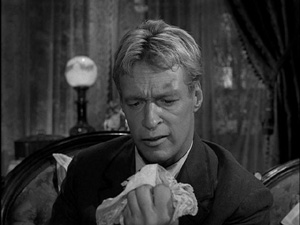
ORIGINALLY BROADCAST AS EPISODE 049
STARRING CAST: Russell Johnson, John Lasell, Bartlett Robinson, Paul Hartmann
WRITER: Rod Serling
DIRECTOR: David Orrick McDearmon
SUMMARY: Peter Corrigan, member of a rotary club, travels backward in time attempting to prevent the assassination of Lincoln.
REVIEW: V
Although it opens with a fairly engaging teaser, "Back There" was not one of Serling's better attempts at a logical time travel story. Suddenly, without warning or precedence, Corrigan is deported back to the night of Lincoln's assassination. While he could have been fairly inconspicuous and perhaps created a diversion at Ford's Theater, Corrigan does little more than make himself visible with his theatrics, and falls into the wrong hands - those of killer John Wilkes Booth. Consequently, he achieves nothing, only to return to the present to find that his time travel perhaps succeeded in changing history - (the former butler at the society club is now a cultured sophisticate) but inconsequentially. As Corrigan, Russell Johnson's performance seems strained and distant, and the direction by David Orrick McDearmon (who had cast Johnson in "Execution" earlier) doesn't do anything to light any fires. The makeup on many of the actors and staging of the 1860's looks like something done by a community theater production. But the fault is mostly with the material. Whenever Twilight Zone tried to transport its characters back to fixed historical dates intending to alter or participate in history, the results were usually substandard.
Memorable Quotations
Peter Corrigan: Now what's your point? That if it were possible for a person to go back in time, there'd be nothing in the world to prevent him from altering the course of history? Is that it?
First Card Player: That's right. Let's say, Corrigan, that you go back in time. It's October 1929. The day before the stock market crash. Now, you know that on the following morning securities are going to tumble into an abyss. Now, using this prior knowledge, there's a hundred things you could do to protect yourself.
Peter Corrigan: But I'd be an anachronism. I really don't belong back there.
First Card Player: You could sell out the day before the crash.
Peter Corrigan: But what if I did and started the crash earlier? Now, history tells us that on October 24, 1929, the bottom fell out of the stock market. That's a fixed date. It exists as an event in the history of our times. It can't be altered.
First Card Player: And I say it can. Now, what's to prevent me, say, from going to a broker on the morning of October 23 or the 22...
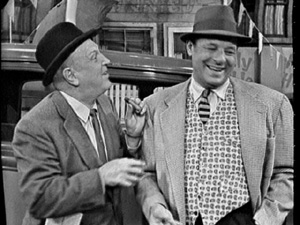
ORIGINALLY BROADCAST AS EPISODE 050
STARRING CAST: Jack Carson, Loring Smith, Arte Johnson, Jack Ging, Patrick Westwood, Nan Peterson
WRITER: Rod Serling
DIRECTOR: James Sheldon
SUMMARY: Used car salesman Harvey Hunnicutt is, by nature, a pathological liar. A customer comes in one day and sells him an automobile that forces him to tell the truth!
REVIEW: V
Here Serling deals with one of the oldest tricks in the hat, the posession of an object that serves as a kind of truth serum, until its owner relinquishes it to someone else. But why Nikita Khruschev? And what's never rationalized is how they managed to get The Premiere to visit the larceny-loaded Hunnicut's used car outlet.
Jack Carson and Loring Smith offer vastly entertaining performances, which keep things afloat. One feels that Arte Johnson (best known for his appearances on "Laugh In") should by rights have been more involved as Hunnicut's associate, instead of giving him no more than sixty seconds of camera time, and then having him throw what has got to be one of the lamest punches in TV history. If nothing else, this show should definitely not have been shot on videotape; or, it should not have been staged as an outdoor arena.
In spite of its debits, "The Whole Truth" shows its lead talent, Carson, clearly having a good time with the part, something that can't be found in more than a handful of episodes.
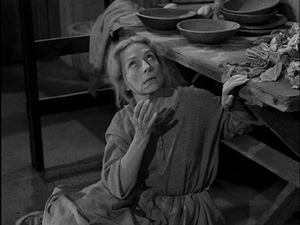
ORIGINALLY BROADCAST AS EPISODE 051
STARRING CAST: Agnes Moorehead
WRITER: Richard Matheson
DIRECTOR: Douglas Heyes
SUMMARY: An old woman who lives alone in a farmhouse gets terrorized by evil aliens...from Earth.
REVIEW: II
Richard Matheson's "The Invaders" was a high point of the show's second season. An old woman, who hasn't seen any action in years, is suddenly thrown into this semi-extraordinary situation. It stands more as a fine visual work rather than as a typical Twilight Zone drama.
The first shot, and the most impressive, is a distant view of the farmhouse, located in "one of the out of the way places, the unvisited places, bleak, wasted, dying...a house without electricity or gas...a house untouched by progress." It has only the necessary elements...fire, water, air, wood. After a few moments of narration, the camera finds Serling outside the window of the house, dangling lit Pall Mall in hand, as a hag (the great Agnes Moorehead) pares some vegetables for her evening stew and throws them into a cauldron, nibbling sloppily on a few pieces of cabbage. She picks up a kitchen knife and feels the blade with her fingers, which turns out to be a mere preface to the discord ensuing. Incidentally, this was one of maybe two or three shows where Serling was actually seen on camera with actors in the same frame.
George Clemens was faced with the monumental task of filming in low light. There are many nice shots, but the best has got to be the one where Moorehead tries to peer into the spaceship with dropped jaw. The ramp lowers as she tries to figure out what the spaceship even is, and then the sinister aliens emerge.
From then on, it's a desperate fight for survival as the spacemen and the hag move from floor to roof, room to room. Although we never see the spacemen levitated, they most assuredly have that capability. They manage to blast a hole in the wall and slice the woman's hands with the kitchen knives. She breaks out in welts when they fire ray guns at her. She rather skillfully fends them off and succeeds in killing one, a man called Grisham. As Spaceman #2 makes a report to Earth not to send out any more men to the place, she destroys the spaceship and him. The voice of Spaceman #2 was none other than that of Douglas Heyes, the episode's director.
This all was a far cry from glamourous mother Endora that Agnes Moorehead would play on "Bewitched" for eight seasons. The part is the only one in the canon with no dialogue, but she did great things with it. Comedian Shelley Berman, who would later star in Twilight Zone, comments. "Before I was cast (in the episode "The Mind and the Matter"), I remember seeing that one with Agnes Moorehead, where not one word was spoken until the end, and I said to myself, 'My God, I get to star on THAT show?!'" "The Invaders" does bear the distinction of having not a single word of dialogue until the episode's last scene.
Look closely as she waits for one of the invaders to come in through a hole blasted in the wall...sweat and saliva pour off of the poor woman. Coincidentally, her screen daughter Elizabeth Montgomery took on a similar part in the third season episode "Two" shortly thereafter, which also required her to be grimed and unelegant. But her long-suffering son-in-law, portrayed by Dick York, got a role in the next week's episode which was much like the Darrin Stephens he'd become in prime time.
Memorable Quotations
Gresham: Come in, Central Control. Come in, Central Control! The ship's destroyed. Gresham is dead! I repeat, Gresham is dead! Incredible race of giants here! No counterattack! Too much force! Too powerful! Gresham and I...are finished!
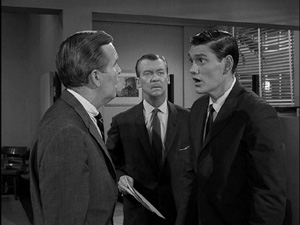
ORIGINALLY BROADCAST AS EPISODE 052
STARRING CAST: Dick York, Dan Tobin, June Dayton, Hayden Rorke, Harry Jackson
WRITER: George Clayton Johnson
DIRECTOR: James Sheldon
SUMMARY: Hector B. Poole tosses a coin that lands on its edge in a newspaper man's coin box, which somehow gives him telepathic ability.
REVIEW: III
Tales of telepathy made periodic visitations to "The Twilight Zone". The most notable entries were Richard Matheson's "Mute" in the fourth season and "A Penny For Your Thoughts" by George Clayton Johnson. In Johnson's original short story, a man named Prentiss gets hit by a car, which in turn causes the telepathy. It was suggested during filming the television version that Hector Poole tossing a quarter into a newspaper collection box and having it land on its edge - would be more interesting. This feat was achieved quite easily, by welding a wire onto the edge of the coin, then pulling the wire tautly. The coin stays on its edge, until the end of the story when Poole collects the evening paper after tossing another coin into the box.
Once again, fine casting made an otherwise mundane story worthwhile. In the lead was Dick York who, of course, was soon to become Darrin Stephens on "Bewitched". June Dayton (Poole's coworker) had appeared in Serling's "Patterns" in 1955, alongside a 17-year old Elizabeth Montgomery. At the time, Hayden Rorke (Mr. Sykes, who aims to gamble with company funds) was not yet known as Dr. Bellows of "Bewitched"'s Nielsen adversary, "I Dream of Jeannie".
Memorable Quotations
Hector B. Poole: Miss Turner?
Helen Turner: Yes, Mr. Poole?
Hector B. Poole: Well, uh, please don't be offended but, well, I, uh, I would like to thank you for your kind thoughts.
Helen Turner: Well, I don't think I quite understand, Mr. Poole.
Mr. Brand: Romancing the help, Mr. Poole? Well, who can blame you? Miss Turner is the prettiest girl in the accounts section. {Thinking} Which is saying absolutely nothing. I haven't seen such an aggregation of beasts since the last time I went to the circus. {Aloud} Not much chance for socializing around a bank, is there? {Thinking} This one's probably a tiger under the proper conditions. All the sweet, prim types revert to the jungle once more. {Poole pours water on his head} You did that deliberately! I'll see you later about this.
Helen Turner: {Thinking} Good for you. He certainly had it coming. {Aloud} I suppose I should get back to my desk.
L.J. Smithers: {Thinking} Four hundred and one. Four hundred and two. Four hundred and three. Twenty years at the same desk. It isn't fair. Ah, but they'll be sorry for their treatment of me. Yes, at four-thirty this afternoon, I'll go into the vault like I always do. I'll take my briefcase with me and no one will suspect a thing. I'll fill my briefcase with currency and be on ship to Bermuda by nightfall. They'll all be sorry. Yes, indeed. I wonder how long it will take them to discover that the money is gone.
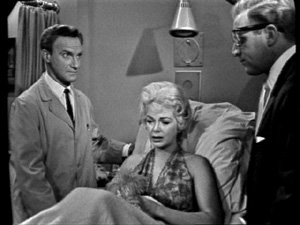
ORIGINALLY BROADCAST AS EPISODE 053
STARRING CAST: Barbara Nichols, Jonathan Harris, Fredd Wayne, Arline Sax
WRITER: Rod Serling
DIRECTOR: Jack Smight
SUMMARY: Liz Powell, professional dancer, is hospitalized for overwork and nervous fatigue. Every night she awakens from a nightmare and goes down to the hospital morgue where she has a most horrifying experience.
REVIEW: V
Although it had a fine working premise in the main character's mechanical nightmare, this was an episode designed to come off far better than it did. Save for a few creepy minutes when Liz Powell makes her way down to the morgue and gets greeted by a nurse who says, "Room for one more, Honey!", "Twenty Two" is marred by oddity. Jack Smight's direction seems on target, but given the flaccid set of characters and a limp storyline, significant rewriting would have had to be done in order for it to make complete sense. Supposedly cured, Liz Powell heads for the airport, preparing to board Flight 22, shocked to discover that the stewardess is the same woman who greeted her at the morgue. Instead of facing her fears and boarding the plane, she retreats once more, just in time to semi-convince herself that what she's been a part of is not a dream, and watch the plane take off and explode. It is never made clear as to whether or not her release from the hospital was because she was cured of her neurosis. But had she confidently boarded the plane, even with the explosion it would have been reasonable closure. Or, had the explosion aftermath given the impression that Liz Powell had been spared a real tragedy and gotten a second chance for a more fruitful life, it might have made more sense. But the way it was done is pointless. And what about the beautiful phantom lady? Since she's obviously an agent of a higher power, she will no doubt be back to torment Liz Powell in some form or another.
The two supporting characters, a toffee-nosed doctor with a heinous laugh (Jonathan Harris, several years pre-"Lost in Space") and a braindead agent with a frightening pair of spectacles (Fredd Wayne), do little more than make Liz Powell appear worse off than she already is. However, the third supporting character - the nurse of the morgue - represented ideal casting. Arline Sax (later Arlene Martel), of Asian descent, had the exotic physique required for the part.
This episode was produced during the height of the Twilight Zone videotape brigade. The confines of tape hamper a number of scenes, particularly the final sequence with the airplane. The production staff supposedly rigged up a model airplane saddled with small plastic explosives, and the result looks like someone just threw a bundle of lit sparklers across the soundstage.
Memorable Quotations
Liz Powell: I know what I saw! I know what I did!
The Doctor: I'll tell you what, Miss Powell. To prove my point, let's try something different.
Liz Powell: Like what?
The Doctor: You say it always happens in such pure chronology, that your actions are always the same. Tonight, when you're dreaming, or as you say when you're waking up, don't reach for the glass. See if breaking the routine a bit won't stop it from happening.
Barney Kaminer: Now that sounds like a groovy idea, Doc. Why don't you try it, kitten, huh? Why don't you try it?
Liz Powell: Barney, Barney, will you tell him? When the same thing happens to you for six nights in a row...
The Doctor: Overwork, fatigue, tiredness. A nightmare at this point would not be abnormal, Mr. Kaminer. A nightmare in this case would be the normal. Well, Miss Powell, let's see what this evening brings, shall we.
Barney Kaminer: Yeah, well, I gotta be running along, kitten. Now you stay hip to what the doc here is telling you. I'm sure glad to see you feeling, uh, looking so good again.
Liz Powell: Thanks a heap, Barney. You know, you couldn't boost morale if it weighed a quarter of a pound and you had a derrick. Thanks for coming over. You must do it again sometime, only make it next year, will ya?
Barney Kaminer: Ah, kitten baby!
Liz Powell: Get out, will ya, Barney!
Barney Kaminer: Sure, Liz, sure. {Barney leaves}
The Doctor: Remember about tonight, Miss Powell. When you feel compulsion to repeat the nightmare, don't do it. Now, relax. Get to sleep. I think we're on our way to recovery.
Liz Powell: We're just delighted that we feel that way.
The Morgue Nurse: Room for one more, honey.
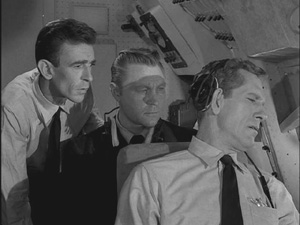
ORIGINALLY BROADCAST AS EPISODE 054
STARRING CAST: John Anderson, Paul Comi, Sandy Kenyon, Harp McGuire, Nancy Rennick, Beverly Brown, Betty Garde
WRITER: Rod Serling, with technical advice from Robert Serling
DIRECTOR: Justus Addiss
SUMMARY: Trans-Ocean Airways Flight 33, headed from London to New York, runs into a tailwind that picks up so much speed that the plane travels backward in time to the dinosaur age. The crew picks up enough speed to break the sound barrier but only manage to get back as far as 1939.
REVIEW: I
Ordinary flight from London to New York. There are probably ten flights per day making this particular journey. But one of them succumbs to odd environmental conditions and catapults everyone onboard backwards and forwards through time.
This is Twilight Zone at its best, and it holds a place with the finest. John Anderson is superb in the lead - never succumbing to hysteria and despite the crisis, infinitely calm - almost like a doctor performing a difficult surgery. The supporting cast too are excellent.
Rod Serling sought the aid of his brother, an aviation engineer, while he was writing the script. It paid off greatly...the dialogue couldn't be more accurate, if not accurate-sounding to the layman, and was entrusted to a fine group of actors led by John Anderson. Instead of succumbing to hysteria, they concentrate on getting the plane down in one piece, in 1961. They don't succeed, and have to settle for 1939.
Memorable Quotations
Captain Farver: Hold it. Hold it a minute. Did you feel anything?
First Officer Craig: Feel anything? No. What do you mean?
Captain Farver: I don't know. I felt something. Something funny. Like a sensation of speed. I can't put my finger on it. Guess I'm getting old.
First Officer Craig: True airspeed 470. We're level. Suppose we picked up a tail wind?
Captain Farver: Yeah, maybe. Those jet streams are tricky. It's that crazy feeling I can't shake. You can't feel a tail wind but I feel something.
First Officer Craig: Everything looks fine.
Captain Farver: Magellan, try and get me a ground speed check with the Doppler.
Navigator Hatch: Indicates nine hundred. That's impossible. I'd better check with Loran.
Janie: What's going on?
Navigator Hatch: Hold it a minute. Skipper, Loran indicates a ground speed of 830 knots. I never heard of a tailwind like that.
Captain Farver: Check it again. See if you can raise the weather ship Charlie.
Second Officer Wyatt: Yes, sir.
Captain Farver: Ask them for a radar fix on the ground speed check. Magellan, are you sure about that ground speed?
Navigator Hatch: I'm not only sure, but we're still accelerating. 980 now. 1120. 1500. God in heaven, I can't even keep up with it.
Second Officer Wyatt: {Into the radio} Global 33 to weather ship Charlie. Global 33 to weather ship Charlie.
Captain Farver: What about Charlie?
Second Officer Wyatt: Nothing, sir. I can't raise them.
Navigator Hatch: 2100.
First Officer Craig: Oh, I hope the wings stay on.
Captain Farver: They will. Don't worry about the wings. It's the true air speed that counts. Ground speed means nothing. Well, we just hit one lulu of a jet stream. Magellan, my needle just reversed past Gander VOR. How could we get past-? Get me a fast position check.
Navigator Hatch: Skipper, we are past Gander. We must be doing three thousand knots.
Captain Farver: Try to raise Harmon control. If you can't raise them, try Moncton or Boston. At this speed, you might as well try to get Idlewild.
Second Officer Wyatt: {Into the radio} Harmon control, this is Global 33. Harmon, do you read us? Moncton. Moncton, this is Global 33. Boston. Boston control, this is Global 33. Boston, please acknowledge. Idlewild. Idlewild, this is Global 33. Idlewild, do you read us? No soap. I can't raise anyone.
First Officer Craig: Skipper, do you know what that is?
Captain Farver: I know exactly what it is. It's the New York World's Fair.
Second Officer Wyatt: New York World's Fair? But that means we'd be back in-
Navigator Hatch: 1939. We came back. We came back...dear God, not far enough!
Captain Farver: Can't land. Can't land at LaGuardia. Can't land in 1939. We've gotta try again.
First Officer Craig: Well, what about the passengers?
Captain Farver: I think we'd better let them in on it. {Into the cabin PA} Ladies and gentlemen, this is your captain. What I'm about to tell you...what I'm about to tell you is something I can't explain myself. Your crew is as much in the dark as you are. If you look out on the left-hand side of this aircraft, you'll see directly below an area called Lake Success. And those buildings aren't the United Nations. They happen to be...they happen to be the World's Fair. What I'm trying to tell you is that somehow, someway, in some manner, this aircraft has gone back into time and it's 1939. We're going to try to increase our speed and go back through the same sound barrier we've already done twice before. I don't know if we can do it. All I ask of you is that you remain calm and pray.
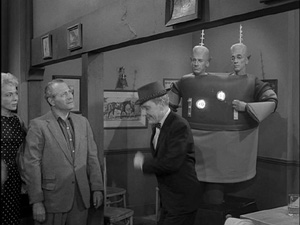
ORIGINALLY BROADCAST AS EPISODE 055
STARRING CAST: Burgess Meredith, James Westerfield, Don Rickles, Eddie Ryder, Douglas Spencer, Michael Fox, James Milhollin
WRITER: Rod Serling
DIRECTOR: John Brahm
SUMMARY: Luther Dingle, vacuum cleaner salesman, is the hapless victim of experimentation by aliens from outer space. They give him the strength of a million men, allowing him to lift statues with his index finger and rip apart rocks. But when the aliens discover that he doesn't put the talent to good use, they take it away and give him an I.Q. that's off the charts.
REVIEW: IV
Burgess Meredith in his second of four appearances, playing a dullard vacuum solicitor who enjoys the local watering hole...and who can't seem to keep his mouth shut when asked for his opinion. Save for some cleverly-engineered special effects, "Mr. Dingle, the Strong" offers very little. Like "The Chaser", it's basically an Aesop's fable made for TV. Seen in one of his very first TV roles is Don Rickles as a barfly, plus a special appearance by James Milhollin as Abernathy, the news reporter cousin to Mr. Armbruster of "The After Hours."
Memorable Quotations
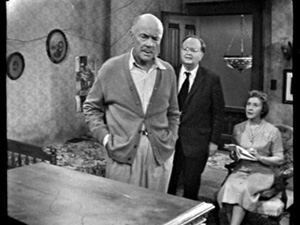
ORIGINALLY BROADCAST AS EPISODE 056
STARRING CAST: Dean Jagger, Carmen Mathews, Robert Emhardt
WRITERS: OCee Ritch and Charles Beaumont
DIRECTOR: Buzz Kulik
SUMMARY: Ed Lindsey gets a second chance at life via the magic of a radio.
REVIEW: IV
"Static" was one of two episodes written by OCee Ritch (the other was "Dead Man's Shoes" in the third season), and the only episode to make commentary on the demise of a much-loved medium. OCee Ritch, who generated the idea for the episode, was a friend of Charles Beaumont and a number of other Southern California writers whose hearts were not in TV, but in radio. By 1960, radio had faded into the background with the advent of television. Radio had been, for nearly half a century, a dimension all its own. The viewer was forced to use his or her imagination when listening to the actors reading out the stories.
This was one episode that really did not work well on videotape. Like George Clayton Johnson's later "Kick the Can", it bears a rather homespun quality that keeps it semi-appealing. Carmen Mathews and Dean Jagger do fine as as Vinnie and Ed, who missed the love boat and never married. But the magic of radio brought them back together.
Sharp eyes will notice the appearance of Alice Pearce (aka the original Mrs. Kravitz - and one of TV's greatest comic actresses) who died at the young age of 49 yet plays an elderly woman in this episode.
Memorable Quotations
Vinnie Broun: Right now, Ed Lindsay, you're just about the meanest, sourest, most cantankerous old man on the face of the Earth. Ed Lindsay: Thanks. Vinnie Broun: And I'm not much better. We've been living like two hermits under the same roof for the last twenty years, staring at each other every morning. Day in, day out. Twenty long years wondering what went wrong. Ed Lindsay: I don't know what you're talking about. Vinnie Broun: Oh, yes, you do. You know exactly what I'm talking about but you won't admit it. We were going to be married. Ed Lindsay: Oh, now, Vin, for heaven's sake. Vinnie Broun: Don't get your back up. I'm not trying to change anything. I'm just talking. We met in this boarding house in 1940 and it was here that you proposed. I wanted to set the date but your mother was ill, you remember, and so you decided to wait, and that's just what we did. We waited and waited until, by the time your mother had died, it was too late. Ed Lindsay: Now, Vinnie, I'm not gonna sit here and listen- Vinnie Broun: Don't interrupt me! I've gotta get this thing said. Oh, I know you don't care anything about me now. I'm just a silly woman who watches television, dyes her hair, grows old. You don't even like me anymore, and I don't blame you. You're a bachelor, set in your ways. You can't change what you are, and neither can I. We had our chance and missed it, Ed. But I'll tell you one thing that's true and I know it's true. You did love me as much as a man ever loved a woman. Didn't you? Ed Lindsay: Yes, Vinnie. That's true. I did, yes. Vinnie Broun: And now you love what we were, what we might have become together. So just about this time every year, it would have been our anniversary, you start getting unhappy. You wanna go back to 1940 and start all over again. Why do you think you keep hearing "Getting Sentimental Over You" on the radio? That was our song, Ed. And those programs. We used to listen to them together in the dark. Ed Lindsay: I had forgotten. Vinnie Broun: When you hear those programs, you're like a young man again with all of your life ahead of you. But it isn't so, Ed. It's all over between us. We missed our chance. We can't go back. Ed Lindsay: You think it's all in my mind, don't you? You think that I've just imagining that- Vinnie Broun: Ed! Ed Lindsay: I hear the radio, don't you? That's what you think. That's not true at all. It's not true. Get out of here, Vinnie. Get out of here. Leave me alone. Just leave me alone.
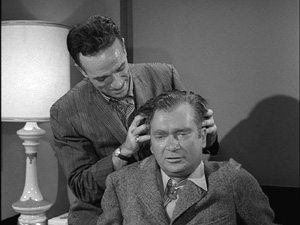
ORIGINALLY BROADCAST AS EPISODE 057
STARRING CAST: Buddy Ebsen, Dane Clark, Christine White
WRITER: Charles Beaumont, based on a story by George Clayton Johnson
DIRECTOR: Buzz Kulik
SUMMARY: Jimbo Cobb has the ability to move objects around, telepathically. But can he take on the card tables in Vegas?!
REVIEW: III
As far as it goes, "The Prime Mover" is a funny piece of drama, featuring fine and unassuming performances by Buddy Ebsen, Christine White, and Dane Clark. As in "The Fever", gambling is the focus, but this time the emphasis is on the sentimental. Although uncredited, the story was adapted by Charles Beaumont from the short story of the same title by George Clayton Johnson. Ebsen and Clark are perfect compliments to each other as Jimbo and Ace, broke small town diner operators who have little more in life than their work...until they discover Jimbo's superpowers. But this turns out to be the impetus for a life turnaround for Ace and Kitty...Ace loses all his winnings to a big-time gambler and perhaps love will be the thing that leads them to even greater fortunes.
Memorable Quotations
Ace Larsen: Sure it is, Phil. Sure it is. Ba da boom, huh, honey! Right? Win a million, lose a million, just like that, right. Okay, eleven is the number. Jimbo Cobb: Ace- Ace Larsen: You got it? Eleven! And this is it. Jimbo Cobb: Ace- Ace Larsen: Now don't bother me. Jimbo Cobb: Ace, listen, I- Ace Larsen: Alright, eleven. Eleven, eleven, eleven! And there it is! Phil Nolan: Tough luck, trooper. Ace Larsen: Huh? Phil Nolan: You got nerve, pal. I like that. {Ace sees that he rolled a three} Next time you want to play a little game, trooper, give us a call. {They all leave} Jimbo Cobb: Look, I'm sorry, but I was trying to tell you I...something happened. I lost the power. I guess a fuse blew out. You're not mad at me, are you, Ace? I mean, I couldn't help it. Sheila: You mean we're not going to Lake Mead? Ace Larsen: Well, he blew his fuse. {Sheila leaves} You blew... {Ace starts laughing} You blew a fuse? {They both start laughing} Kitty: You sure you don't want to stop them? Ace Larsen: What are you talking? Who needs that hunk of junk anyway? That's strictly for suckers. Come on. Out, out, out, out, out! Go on, you one-armed bandit. Go rob somebody else for a change. Um, Kitty? Kitty, look, I was thinking, you know, now that that thing's out of here, I bet you that Jimbo and me could, you know, pull enough money each month to, after what we, you know...will you marry me? {Jimbo drops his broom} Won't you be quiet? I'm proposing, for crying out loud. Kitty: Jimbo, do you have a quarter? Call it. {Flips the quarter} Ace Larsen: Heads? Kitty: Alright, Mr. Larsen. I will marry you.
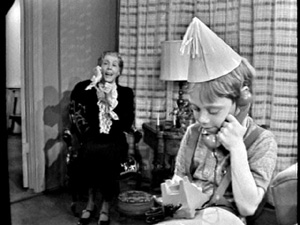
ORIGINALLY BROADCAST AS EPISODE 058
STARRING CAST: Bill Mumy, Lili Darvas, Philip Abbott, Patricia Smith
WRITER: Bill Idelson and Charles Beaumont
DIRECTOR: James Sheldon
SUMMARY: Billy Bales turns five years old and is given a toy telephone by his grandmother just hours before she dies. She does this so they can stay in touch after she's dead.
REVIEW: II
Bill Idelson was a comedy writer who began his career in Hollywood as an actor. He did some dramatic writing for television, including this episode, but he is best known as one of the leading comedy writers of the 1960's and 70's ("The Dick Van Dyke Show", "The Odd Couple", et al). The early drafts of the script were entirely Idelson's, but supposedly Beaumont contributed to what was aired.
"Long Distance Call" fell victim to "The Twilight Zone" videotape experiment. Like "The Whole Truth", much of the credibility is slogged down by the use of tape. Phillip Abbott, Lili Darvas, and Patricia Smith do fine acting, and all get their turn in the spotlight. In his first of three showings on the series, Bill Mumy eventually proved himself as one of the industry's leading child actors of the day. Like Ron Howard and several others who worked regularly at that time, Mumy displays a thoughtful intelligence and understanding of the part, versus merely speaking the lines by rote.
One interesting element of "Long Distance Call" that is not often identified is the possessiveness of the grandparent over the grandchildren and a cold, undemonstrative attitude toward the in-laws. This happens with many grandmothers, in fact. The reasons for it often remain unknown while the grandparent is alive and gets entombed with her when she finally dies. The grandmother of this story, old and infirm, is the villain who shows some mercy in the end and lets her grandson live. Director James Sheldon (who also directed "The Whole Truth" on tape plus others on film) looks back on this episode with good memories. "I had to use Bill Mumy in one last shot that I didn't quite get right during the work day. I had him work after hours and had the child labor people found out about it, I'd have really caught hell. Luckily, his mother was a nice lady and agreed to let him do it."
Memorable Quotations
Chris Bayles: Mother, if you can hear me, listen. You said you loved Billy. At his birthday, you picked him up and you hugged him, and you said he gave you life again. If you really love Billy, give him back. He's only five. He hasn't even started. He doesn't know anything about going to school, or girlfriends, or wearing long pants. Even pitching a baseball. He's hardly been out of this room, out of this house. There's a whole world he hasn't even touched. Mother, you said Billy gave you life again. Now you can give him life. If you really love him, let him live. Give him back. Give him back, Ma! Ma...
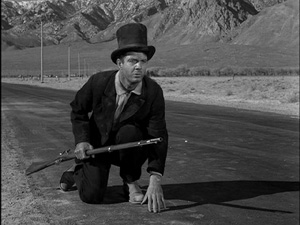
ORIGINALLY BROADCAST AS EPISODE 059
STARRING CAST: Cliff Robertson, Evans Evans, John Crawford, Ed Platt
WRITER: Rod Serling
DIRECTOR: Buzz Kulik
SUMMARY: Christian Horn, one of a band of folks heading west, needs medicine for his ill son. The year is 1847. They are almost out of water and food. Horn heads over a sand dune, only to find a highway. Walking down the road, he stumbles into a diner where the proprietors give him penicillin and he spots a calendar that says 1961. They call the police, but Horn escapes and returns to 1847 with a new sense of hopefulness.
REVIEW: I
It was an episode that might've been laughed off. "I did some research on that one," Cliff Robertson related recently. "I thought it would make sense for this man to be dressed in this suit with tails, and a top hat." This wasn't what was written in the script. "Then someone blew the whistle on me, thinking the top hat was a mistake. But, dammit, it made sense to me! Then a call came in from Rod, who said, 'Beautiful. Keep it.' That's the kind of guy Rod was, very supportive of his actors. I'll always be grateful to him."
The attention to detail was worth it. The New York Actor's Studio actor strived for realism in his first of two Twilight Zone assignments. The idea was pretty straightforward - a group of people from Ohio making their way west in Conestoga wagons in the mid 1800's, with no posessions except for the clothes on their backs. The leading man was to wander over a horizon with his rifle, and find a highway with semi trucks and telephone lines....in 1961. Robertson imbues every subtle gesture, every mannerism, with all the bewilderment of someone who was from another world, another time. When handed a glass of water, he holds it by the bottom of the glass, uncertain as to why the water wasn't coming out of a canteen. A town doctor (Ed Platt, later of "Get Smart") looks him over and verifies the fact that this is not a man from the twentieth century, that "even Freud would have had something to gnaw on here!" But it is all with good purpose; Horn goes into the time warp just long enough to ensure that his son survives.
Memorable Quotations
Christian Horn: What you got there?
Mary Lou: Penicillin. It'll keep away any infection.
Christian Horn: Where did you get it?
Mary Lou: At the drugstore. You feel alright?
Christian Horn: You say this is good for a sickness?
Mary Lou: Well, sometimes, depending on what it is.
Christian Horn: I've got a real sick boy back in the wagon.
Mary Lou: You mean you brought your family with you?
Christian Horn: There were three wagons. And I looked around and I...what is that? What is that? That looks just like...oh, God in heaven, how could that be? That says September 1961 when it's 1847! Who are you? Who are you and where am I? Where is this place? Where am I?
Mary Lou: Well, Doc, what do you think?
The Doctor: If you had some bourbon, Mary Lou, I'd prefer that at the moment, but coffee will do for second best.
Joe: {Arriving} Having coffee, huh? Take a look at him, Doc? The Doctor: I did indeed. Malnutrition, that's his major problem, although he's not a bad specimen of a man, I'll say that. And you were right, Joe. He's an interesting customer.
Joe: Must have been the heat, huh? Or something? Well, I mean, Doc, he's just not rational.
The Doctor: Now, I'm not a psychiatrist, Joe. I'm just an old-fashioned GP. But Freud himself would have something to gnaw on here.
Joe: Aw...
The Doctor: Well, he happens to seem very rational.
Joe: Oh, Doc, come on!
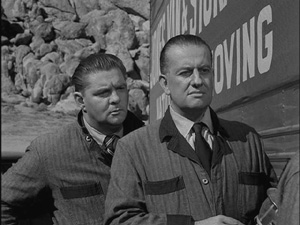
ORIGINALLY BROADCAST AS EPISODE 060
STARRING CAST: Oscar Beregi, Simon Oakland, Lew Gallo, John Mitchum
WRITER: Rod Serling
DIRECTOR: Justus Addiss
SUMMARY: Four men hold up a train and collect a fortune in gold bullion. In attempt to collect off its worth without having to worry about being caught, they time-travel to the year 2061.
REVIEW: II
While "A Hundred Yards Over the Rim" used the accidental crossing of a physical space-time barrier as a means of generating time travel, "The Rip Van Winkle Caper" uses a suspended animation mechanism designed by chemist/physicist professor Farwell. An episode well-remembered almost solely for its twist ending, it is both a fine TZ sci-fi installment and character study. The trek through the desert featuring Beregi and Oakland is a gripping drama, superbly directed. Oakland had previously played the wise psychiatrist at the end of "Psycho"; here he plays the greasy DeCruz, intent on gaining the entire lot of the loot. Footage of a train heist would have added a touch more spice to the teaser, but as per usual,the actors carry the material at a level so much higher than most shows of the day that it really wasn't necessary.
This episode, like "A Hundred Yards", was shot out in the desert of Lone Pine, California. However, the final sequence of Beregi and Oakland, dehydrated and trying to get to town, was filmed in the desert of Palmdal, near Edwards Air Force Base. 60+ years later, Palmdale has become somewhat of a bedroom community with sprawling real estate development.
Memorable Quotations
Farwell: The piece de resistance now. The real combination. Ultimate ingenuity. It is one thing, gentlemen, to stop a train on its way from Fort Knox to Los Angeles and steal its cargo. It's another thing to stay free to spend it, and spend it we shall.
DeCruz: Yeah, but when?
Farwell: Don't you know, Mr. DeCruz? I would have thought that this aspect of the plan would be particularly key in your mind.
DeCruz: Rip Van Winkle. That's what we are. Four Rip Van Winkles. I'm not sure.
Farwell: What are you not sure of, Mr. DeCruz?
DeCruz: Just lying down in one of these, these glass caskets and getting put to sleep. I like to know what I'm doing.
Farwell: You know what you're doing. I've explained it very precisely to you. All four of us will be placed in a state of suspended animation, and when we wake up, that's when we'll take our gold and enjoy it.
DeCruz: I say everybody takes his cut now and takes his own chances.
Brooks: That's what you say, DeCruz, but that ain't what we agreed on. Now, we agreed we'd stash the gold here and then do whatever Farwell tells us to do. So far he ain't been wrong, not about anything. The train, the gold, the gas he used to put a whole trainload of people asleep - everything! All we had to do was step over a lot of horizontal folks snoring, transfer a fortune like it was cotton candy.
Erbie: Amen to that.
DeCruz: Amen to that, sure, but how about to this? None of you mind being helpless and closed up in these?
Brooks: No, Mr. DeCruz. None of us mind.
DeCruz: How long, Farwell?
Farwell: How long? I don't know exactly. I can only surmise. I would say that, I would say approximately one hundred years from today's date. One hundred years, gentlemen, and we shall walk the earth again, as rich men, however, as extremely rich men.
DeCruz: One hundred years. Just like Rip Van Winkle.
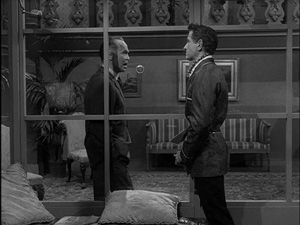
ORIGINALLY BROADCAST AS EPISODE 061
STARRING CAST: Franchot Tone, Liam Sullivan, Jonathan Harris, Cyril Delevanti
WRITER: Rod Serling
DIRECTOR: Boris Sagal
SUMMARY: Archie Taylor gets tired of hearing the voice of young Mr. Jamie Tennyson at their rotary club meetings every week and challenges him to a bet - that he can't remain silent for one calendar year.
REVIEW: III
Although it has no fantasy element, "The Silence" remains a remarkable episode. Acted with intensity by Franchot Tone, Liam Sullivan and Jonathan Harris, it features one of the most chilling conclusions, and some of the best photography. The story goes that Tone was slapped around by a jealous man at a party, scarring up the left side of his face. They shot only the right side for nearly all the intermediate scenes, which included Archie Taylor's visits to the glass room where Tennyson was permanently housed. Tone was reportedly intoxicated through most of the shooting, but this is imperceptible. Like Dr. Smith he created several years later on "Lost in Space", Harris proves once again that dramatic characters were his forte.
As Douglas Heyes had done magnificently with "The After Hours", director Boris Sagal directed "The Silence" so as to provide the show with a very high level of suspense. Tension rapidly builds as twelve months dissolve. The rotary club members are once again assembled, ready to proclaim the old man a scum and the fly-by-night youngster superior. But it is Tennyson who ends up in tears, having been undermined by great underestimation of his own character. Who ends up worse? They both cheated.
Tone and Sullivan playing opposite each other proved excellent casting, guided well by Sagal. The situation Serling captured is one all too familiar--the young upstart grates on the Augustian's nerves, to the point where the mere sound of his voice becomes intolerable. The solution seemed easy: pay him to shut up.
Also noteworthy was Cyril Delevanti playing the rotary club butler. Then aged 72, with a list of character acting credits that dated back to the late twenties, he continued to work regularly up until his death in 1975 (in fact, he outlived Rod Serling!).
Memorable Quotations
Jamie Tennyson: May I ask what is the reason for this wager?
Archie Taylor: What I'm about to say might horrify the average person, but to someone as insensitive as you, it probably won't mean a thing. I dislike you intensely, Tennyson. It goes much beyond the ordinary distaste I feel for someone without breeding, without principles, without manners. Your voice has become intolerable. I sit here each night and the sound of it makes me wince. I cannot ask you to resign from the club. I haven't got that right. So, it occurred to me that I'd be willing to offer a large sum of money just to have some quiet. You see, Tennyson, you could not possibly remain silent for a year. It's not in your nature. You're a shallow, talkative, empty-headed ne'er-do-well, and to remain silent would destroy you. So what I assume will happen. You will perhaps withstand the pressures for three or four weeks, maybe a couple of months, and then you will succumb. That's again, your nature. In the meantime, I will derive, oh, several months of exquisite silence. Well, Tennyson? Does it appeal to your sporting blood?
Jamie Tennyson: Oddly enough, it does appeal to my sporting blood.
Archie Taylor: Now that, too, is patently ridiculous. There's nothing sporting about you, Tennyson. I happen to know that you're delivering your nightly financial falderal because you're in desperate straits. You've run through your inheritance, your debts are insurmountable, and you'd do practically anything for money, except perhaps to remain silent for a year.
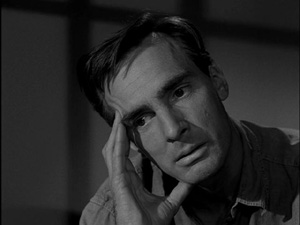
ORIGINALLY BROADCAST AS EPISODE 062
STARRING CAST: Dennis Weaver, Harry Townes, Wright King, William Edmondson, Anne Barton
WRITER: Charles Beaumont
DIRECTOR: John Brahm
SUMMARY: Adam Grant is convicted of first-degree murder, sentenced to death by electrocution. But he never quite dies.
REVIEW: I
Those who know Dennis Weaver for his long-running role on "Gunsmoke" are often surprised by his gripping portrayal of Adam Grant in "Shadow Play". Like Edward Hall in Beaumont's "Perchance to Dream", Grant is continuously living a nightmare, dreaming in serials. Here he's on trial for murder and undergoes execution. The difference here is that Grant's entire life is a cycle, with each re-enactment featuring a different person playing a different role.
"Shadow Play" is a complicated piece, in more ways than one. In it's entirety, it is a dream sequence...taking place only in the shadows and constructs of Adam Grant's mind. Is the whole story a dream, or is it reality? Or a combination of both? The casting couldn't have been much better, with Weaver and Harry Townes in the leads, supported in style by Wright King, Anne Barton, Bill Edmondson, and Mack Williams. Instead of a super-flashy Twilight Zone-style conclusion, all ends quietly as everything goes dark and Adam Grant finds himself in the courtroom again, the cycle beginning anew.
Wright King, a former New York Actor's Studio actor (best known today for his parts on the first Planet of the Apes, Twilight Zone, and "A Streetcar Named Desire") who here plays a newspaper press man and the jury foreman, has fond memories of "Shadow Play". "Dennis Weaver and I had done "Gunsmoke" together around the same time...his kids and my kids actually shot a mini-Western on the backlot of MGM one time. Harry Townes was a sterling actor... not too many working in TV better than him. Coincidentally, we moved into a house only two blocks away from his in southern California and carpooled to different shows we did at the time. Anne Barton was also great. That character I played...well, I'll admit, it was the first time I'd played a drunk! I hope I did the part justice!" Indeed, King did more than splendid work as the newspaper man who's overfond of the bottle. "Rod Serling was on the set to do his narration in the courtroom. What a sincere, decent, gentle, lovely man...those were the good old days."
Memorable Quotations
Jiggs: Grant, let me give you some advice. Don't think about it. You think about it, you'll crack up like Phillips there. Listen to him. {Phillips mutters to himself} Phillips! Shut your face! A month ago he was a human being. Now what is he? An animal, a thing. Why? Because he couldn't stop thinking about it.
Adam Grant: I know it. It's just different with me.
Jiggs: You mean you want to die?
Adam Grant: No.
Jiggs: Well, it ain't different with you, so don't kid yourself. Sometimes I wonder, too, what it's gonna be like.
Adam Grant: I'll tell you what it's like. You walk out of your cell, pass two grey doors, seventy-eight steps to the final door. It's painted green. There's a guard that opens the door for you and you go into a room. It's tan. It's all tan. There's nothing in it except one chair. It's like a chair you used to sit in when you were a kid. It's hard and soft.
Jiggs: Now, cut it out! Cut it out!
Adam Grant: They strap your arms and legs. Then they attach the electrodes. It's funny. They always feel cold to the touch at first.
Jiggs: Ah, Grant. You talk like you've been through it already.
Adam Grant: Then they drop the mask. It's musty. Smells like an old sofa. Then you wait. Every muscle tense and straining. Any second. Any second. Then you can almost hear it. They pull the switch...
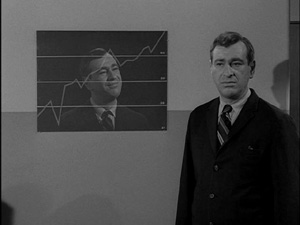
ORIGINALLY BROADCAST AS EPISODE 063
STARRING CAST: Shelley Berman, Jack Grinnage, Chet Stratton
WRITER: Rod Serling
DIRECTOR: Buzz Kulik
SUMMARY: Archibald Beechcroft, a misanthrope, is given a book called "The Mind and the Matter: How to Achieve the Ultimate Power of Concentration" by a coffee boy at his workplace. He reads the book and it changes his life; now he can obliterate all the annoying people in his life and replace them with a world full of Beechcrofts.
REVIEW: IV
Comedian Shelley Berman starred in this cleanest-cut of episodes. Although his performance is amusing, the script has very little. The comedy here is not completely lacking in merit; there are some good humorous tidbits rendered in Berman's trademark nasal drone. Had Serling written Beechcroft as a more eccentric man and had his misadventures with the "Mind and the Matter" book been more laughable, it would have been a far more entertaining. The excess of flat arguments between Beechcroft and his conscience is supposed to carry the show. It worked to great effect in "Nervous Man in a Four Dollar Room", a more finely-chiseled two-character drama. The elevator sequence, with the full-head Beechcroft masks, was likely done only for the purpose of making the most of the labor-intensive products that were supposed to resemble Berman. "Buzz Kulik was great - a fine director. I suggested to Rod that he write in the scene with Beechcroft in drag, and the next day, I got the new pages. The masks, which they worked so hard on, didn't look like me at all...they offered me one to take home, but I didn't," he says.
Memorable Quotations
Archibald Beechcroft: All well and good. All well and good, to be sure. But what's to do? How does one occupy his time?
Beechcroft's Reflection: Too much of a good thing?
Archibald Beechcroft: I wouldn't say that.
Beechcroft's Reflection: But you're thinking it. Bored to death, aren't you?
Archibald Beechcroft: Well, let's just say that, let's just say that I am temporarily somewhat accessible to suggestions as to how to occupy my time.
Beechcroft's Reflection: Let's face it. You are bored to tears. Solitude is one thing but loneliness, loneliness is quite another.
Archibald Beechcroft: Loneliness nothing. I despise people. I loathe them. And I, Archibald Beechcroft, have done away with them. For good and all, mind you.
Beechcroft's Reflection: For good and all. Thought about any alternatives?
Archibald Beechcroft: Alternatives to what?
Beechcroft's Reflection: Alternatives to this. You're bored! You don't have idea one how to occupy your time. People are bad enough but inactivity is even worse. How about it?
Archibald Beechcroft: Oh, don't talk nonsense, please. I'm content. I'm honestly and truly content for the first time in my life. I've rid myself of the worst scourge there is. The populace.
Beechcroft's Reflection: Well, what about the thing that's going to happen to you in the after-
Archibald Beechcroft: Shut up.
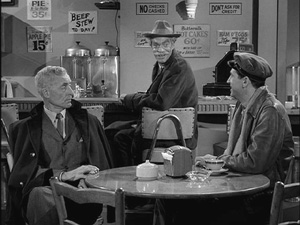
ORIGINALLY BROADCAST AS EPISODE 064
STARRING CAST: Jack Elam, John Hoyt, Bill Kendis, Barney Phillips, Bill Erwin, Gertrude Flynn, Jean Willes, Morgan Jones, John Archer
WRITER: Rod Serling
DIRECTOR: Montgomery Pittman
SUMMARY: A phone call from a frightened woman in the town of Hook's Landing on a snowy February night after hearing something crash-land, the state troopers are sent out to investigate. Finding an object that has crash-landed near Tracy's Pond, they are forced to find the martian...in a diner.
REVIEW: II
Sometimes criticized for its predictability, "Will the Real Martian Please Stand Up" is arguably the strongest comedy entry in a series not known for or terribly proficient at comedy. Carefully-enginineered and choreographed special effects, including sugar and salt shakers that explode, and of course, a third arm belonging to John Hoyt, are nice touches. Wild-eyed western actor Jack Elam as a harmless old bum with no more superpowers than a fly, is a perfect compliment to Hoyt. But of course, it is Hoyt's character who gets what he deserves when he returns to the cafe after the bus and the state police car 'kerplunked' into the river - the least likely is always the most dangerous (Barney Phillips as a disguised Venusian masquerading as the counterman.) Viewers with sharp eyes will notice Bill Erwin as a member of one of the husband/wife couples. Twenty years later he would take the role of Arthur in the highly acclaimed feature film "Somewhere in Time" written by Richard Matheson.
Memorable Quotations
Trooper Perry: The bridge up ahead has been declared temporarily impassable. Ice flow stacked up against. Another pound of weight and it could be driftwood.
The Bus Driver: That's rough. Can't turn around and go back. There's a slide up there at the turnoff. Blocked the whole road.
Haley: Looks like you're kinda marooned.
Trooper Perry: Till morning, anyway.
Ross: Till morning? I've got to be in Boston at nine a.m. The Bus Driver: Then you better start walking, mister, cause that bus stays out there until they fix the bridge. Either that or have them drop some snowshoes.
Trooper Perry: You might as well all get comfortable and get a little hot food in you.
Ross: Oh, that's just great. That's fine, isn't it? Get comfortable and get a little hot food in you. That's precious little consolation for missing my meeting in Boston. That's a fine little bus line you work for, isn't it? They care so much about their schedules, don't they? The Bus Driver: I wouldn't be too hard on them, mister. They have no control over the snow, bridges, the sides of hills that decide to come down. That's pretty much out of their hands.
Trooper Perry: Which one of you wasn't on the bus?
Ross: We were all on the bus. What kind of interrogation is this anyway? If we're going to be grilled, I want to talk to a lawyer.
The Old Man: That's a good one! First he wants snowshoes, then he wants a lawyer.
Ross: I don't remember seeing you on the bus.
The Old Man: That's quite funny, cause I don't remember seeing you neither. Makes one of us a liar, don't it?
Ross: This is preposterous. What difference does it make who was on the bus and who wasn't or whether there were six or seven or a hundred and twenty. Is this a diner or Gestapo headquarters?
Trooper Bill Padgett: You were all on the bus together. You would have known who the other passengers were.
The Bus Driver: That don't cut any ice. They loaded in the snow at Hook's Landing. To tell you the truth, I don't know who got on.
The Old Man: She's just like a science-fiction, that's what she is. A regular Ray Bradbury! Six humans and one monster from outer space. You wouldn't happen to have an eye in the back of your head, would you?
Haley: Something for you?
Ross: Coffee, black.
Haley: One coffee, black. Hey, didn't you, what I mean is, didn't you go out on that bus?
Ross: I did indeed. Oh, yes, I went out on that bus. And do you know something? That bridge wasn't safe. It collapsed. The state police car, the bus, everything - kerplunk. Right into the river. Terrible scene. No one got out.
Haley: Except you.
Ross: Except me. Lucky I guess, huh?
Haley: Very lucky. But, but...
Ross: But what?
Haley: You're not even wet.
Ross: Wet. What's wet?
Haley: What do you mean what's wet? You landed in the river but your clothes are all dry.
Ross: Illusion, that's all. Just an illusion. Like that jukebox playing in the corner. That's an illusion, too. {The jukebox stops} Or that telephone ringing. {The telephone rings} That's an illusion. Just a parlor trick.
Haley: What are you, some kind of magician?
Ross: Who, me? Oh, hardly. {Reveals a third arm!} Now, before you faint dead away, I ought to explain that the name isn't really Ross, and I wasn't really going to Boston. No, I was sent as a kind of an advance scout. You know these cigarettes, do you call them, they taste wonderful. We haven't got a thing like this on Mars. That's incidentally where I come from. We're beginning to colonize. My friends will be arriving very shortly. I think they're going to like it here. It's a lovely area, so remote, so pleasant, so off-the-beaten track. Just the perfect spot for a colony, don't you think, Mr. Haley? While we're waiting, how about a little of what you call music?
Haley: I don't mind. I have to do a little waiting myself. You see, Mr. Ross, my name isn't Haley, and I do agree with you. This is an extraordinary place to colonize. We folks on Venus had the same idea. We got it several years ago. And I think I really ought to tell you now that your friends are not coming. They've been intercepted. Oh, a colony is coming, but it's from Venus, and if you're still alive...I think you'll see how we differ. {Takes off his hat, revealing third eye} And I agree with you about what they call music. Why don't you play some?! Hahahaha!!!
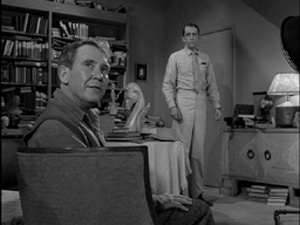
ORIGINALLY BROADCAST AS EPISODE 065
STARRING CAST: Burgess Meredith, Fritz Weaver, Josip Elic
WRITER: Rod Serling
DIRECTOR: Elliot Silverstein
SUMMARY: Romney Wordsworth, a former librarian, is sentenced to obsolescence by the State. His only request is that he die before an audience.
REVIEW: III
"The Obsolete Man" was an odd episode...and an odd choice for the final broadcast of "The Twilight Zone"'s most dynamic season, especially given the story's austerity and notwithstanding that both of the focal characters perish. It is hard to envision such a futuristic society as The State, as well as its litigation for the breezy extermination of undesirables and unproductives. The courtroom, or more appropriately, the 'judgement room' was an impressive set, but the presentation as a whole is difficult to take seriously. The chancellor stands on a podium some twenty feet off the floor. If the long, narrow table that separates the sub-chancellor from the subject were the same length with several feet space in between, the chancellor and the subject would have to be a minimum of thirty feet away from each other, which is ludicrous. On either side stand two groups - as director Elliot Silverstein calls them, "Kafkaesque, black-shirted thugs" but of which no more than three of these individuals seem to have a say in the final ruling. They seem more like two opposing football teams who seem to be there almost for decoration. Outside an enormously tall door, also over 20 feet high, sit two benches where fatigued candidates for extermination wait for their day of wrath. In this society, the people under observation, as is Romney Wordsworth, live in windowless apartment-like rooms. Supposedly there is an outdoors, but it is never seen. This poor world seems to lack any element of the aesthetic, and all is strictly academic and atheistic...yet The State prides itself on only keeping around those who are *not* academic. Perhaps those who are lucky enough to get out of this rotten place should count their blessings!
Burgess Meredith and Fritz Weaver (seen previously in "Third from the Sun", the well-known actor would return to Broadway multiple times in addition to maintaining his forty-year career in TV) skillfully render the roles, despite the talkiness and sarcasm of the material. Particularly touching is Meredith's recitation of The Lord's Prayer, rendered so poetically that few men of The Cloth would not weep over the performance instantly. Meanwhile, the Chancellor sits on the couch, locked in the room that he so unlawfully visited, before the cameras while the clock winds down to zero. It is he who will soon die a death far more violent and with far less distinction than Wordsworth, one of so many innocent beings whom he helped to liquidate. What's more, he becomes the victim of his own self-righteousness and pomposity. "Please, in the name of God, let me out!", the man cries. "Yes, Chancellor. In the name of God, I WILL let you out." So, despite that The State has ruined him, the notion of God's existence has not quite left him entirely.
Despite a difficult script and a few technical challenges, Silverstein had another far greater challenge with "The Obsolete Man", which led to a controversy that ultimately would change the face of directorial rights. When it came time to cut and print the episode, the film editor refused to cut the final scene (the attack of the Chancellor) the way Silverstein demanded. "Despite my nearly throttling the film editor, the ending was never the way I wanted it," he recalled forty-some odd years later. The jury was supposed to stand still and growl until the very end, motionless, until the volume of their growling reached such a volume that they would then envelop the Chancellor and give the suggestion of murdering him. Instead, it was cut with them all moving toward him while they growl, and finally they do attack. Whichever ending the viewer prefers, it is surely one of "The Twilight Zone"'s oddest, coupled with yet another unusuality...one of only several on-camera closing narrations done by Serling.
Memorable Quotations
Romney Wordsworth: There is a God!
The Chancellor: You are in error, Mr. Wordsworth. There is no God! The State has proven that there is no God!
Romney Wordsworth: You cannot erase God with an edict!
The Chancellor: You are obsolete, Mr. Wordsworth.
Romney Wordsworth: A lie! No man is obsolete.
The Chancellor: You have no function, Mr. Wordsworth. You're an anachronism, like a ghost from another time.
Romney Wordsworth: I am nothing more than a reminder to you that you cannot destroy truth by burning pages.
The Chancellor: You're a bug, Mr. Wordsworth! A crawling insect. An ugly, misformed little creature who has no purpose here, no meaning.
Romney Wordsworth: I am a human being!
The Chancellor: You're a librarian, Mr. Wordsworth! You're a dealer in books and two cent fines and pamphlets and closed stacks and the musty insides of a language factory that spews out meaningless words on an assembly line. Words, Mr. Wordsworth, that have no substance and no dimension, like air, like the wind, like a vacuum that you make-believe has an existence by scribbling index numbers on little cards.
Romney Wordsworth: I don't care. I tell you I don't care. I'm a human being. I exist! And if I speak one thought aloud, that thought lives! Even after I'm shoveled into my grave.
The Subaltern: Stand where you are. No further. You have been removed from office. The field investigators have declared you obsolete.
The Chancellor: Obsolete?
The Subaltern: You have disgraced the State. You have proven yourself a coward. You have, therefore, no function. You are obsolete!
With that, Cayuga Productions wrapped up production of its first sixty-five episodes. Still to come were 80-odd more, which would include some of the best. If the first year had been legendary, the second year had cemented the legendarity by a hundredfold. That spring, Rod Serling once again stepped up to the podium to claim his second of two Emmys for the series, but this time the win was not a surprise. The entire staff, but especially the show's other writers and its producer, unofficially shared the award with Serling equally. "The Twilight Zone" had set the standard for television programming.
